2ND TERM
2ND TERM
SCHEME OF WORK
WEEKS TOPICS
1. Revision of last term's work, accidents in the home and school.
2. Accidents in the home and school: need for safety,
Safety in the home, school and workplace.
3. Socialization Agents and Processes: meaning of socialization,
Significance of socialization.
4. Socialization: process of socialization e.g. education, imitation and apprenticeship.
5. Socialization: agents of socialization e.g. family, school and religion organizations.
6. Socialization: agents e.g. press, age grade, clubs and societies.
7. Culture and identity: meaning of culture, meaning of identity.
component of culture i.e. material and non-material.
8. Culture and identity: features of culture i.e. language, food and dressing religion
Characteristics of culture.
9. Cultural similarity in Nigeria e.g. our common heritage, cultural differences in Nigeria.
10. Marriage: definition, forms and types, functions of marriage.
11. Challenges in marriage: effects on children.
12. Revision.
WEEKS TOPICS
1. Revision of last term's work, accidents in the home and school.
2. Accidents in the home and school: need for safety,
Safety in the home, school and workplace.
3. Socialization Agents and Processes: meaning of socialization,
Significance of socialization.
4. Socialization: process of socialization e.g. education, imitation and apprenticeship.
5. Socialization: agents of socialization e.g. family, school and religion organizations.
6. Socialization: agents e.g. press, age grade, clubs and societies.
7. Culture and identity: meaning of culture, meaning of identity.
component of culture i.e. material and non-material.
8. Culture and identity: features of culture i.e. language, food and dressing religion
Characteristics of culture.
9. Cultural similarity in Nigeria e.g. our common heritage, cultural differences in Nigeria.
10. Marriage: definition, forms and types, functions of marriage.
11. Challenges in marriage: effects on children.
12. Revision.
WEEK 1
TOPIC: ACCIDENTS IN THE HOME AND IN THE SCHOOL.
CONTENT:
a) Meaning and examples of accidents in the home and schools.
b) Need for safety.
c) Safety measures in the home,school and workplace.
SUB-TOPIC 1
MEANING OF ACCIDENT
Accident can be defined as an unexpected occurrence that is capable of causing physical harm or damage.
Example of accidents in the home are:-
a) Hot water burns.
b) Fire outbreak
c) Falling down from the staircase
d) Bites from insects or snake.
e) Knife cut.
f) Bruises caused by hitting or knocking the body against an object.

EXAMPLES OF ACCIDENTS IN THE SCHOOL:
(1) Falling down while playing football
(2) Having a sprained ankle while missing a step.
(3) Injuries from sharp objects e.g. razor or bottles.
(4) Burns and scalds from hot chemicals in the laboratory.
(5) Falling down the stair case.

EVALUATION:
(1) What is an accident?
(2) State three examples of accident in the school.
SUB-TOPIC: 2
The Need For Safety:
Safety in the environment involves taking every precaution to ensure that the environment is safe for us to live in. Reasons for safety in the environment include the following:-
(i) A safe environment is a hazard-free environment.
(ii) To sustain the environment so that present and future generations can be supported by the environment.
(iii) To preserve natural beauty of our environment.
(iv) To reduce health-related risks in order to prolong life.
The need for safety is very important as it would to a large extent reduce the accident rates at home, school and working place.

EVALUATION:
Reading Assignment:
Read social studies for Nigerian junior secondary schools by E. Remi Aiyede.
Chapter 6, Pages 49-50.and Solakat new syllabus on social studies for junior secondary schools.by A.Oluwasola oyewole-chapter 6.pages 36-38.
Sub topic. 3
Safety Measures in the Home, School and workplace.
In order to minimize or eliminate accidents from home, the following general steps must be taken:
1. let your environment be clean and sparkling.
2. let there be ventilation all around the home.
3. inflammable objects and liquids must be kept away from home.
4. the use of candles and open lanterns must be discouraged to eliminate fire outbreak.
5. dangerous objects, drugs and medicine must be kept away from the reach of students.

SAFETY MEASURES AT HOME
1.The home and its surroundings should be kept clean always by sweeping the floor and clearing the bushes.
2.Dangerous household utensils such as knife and cutlass should be kept out of the reach of children.
3.Electrical faults should be handled by the experts.
4.Broken glasses,bottles and plastics should be carefully disposed by burying them.
5.The home should be well ventilated.
6.To prevent fire outbreak, the use of candle at home should be used with caution.
7.A generator should never be placed inside a house.
8.The drainage should be clean and unused water containers should be disposed off to avoid breeding of mosquitoes.
9.A well stocked first aid kit to deal with emergencies should be available.

SAFETY MEASURES AT SCHOOL
1.The school building must be well constructed with the right materials to prevent it from collapsing.
2. School laboratory should have apartments or cabinets where dangerous chemicals are kept and locked up. Students should be guided by a teacher during practical classes.
3. A well stocked first aid kit should be available in the school.
4.Students should be properly monitored during sporting activities by a sport specialists.
5.Physical fight between students should attract strict penalty and the students should be well informed about this.
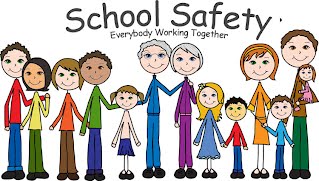
SAFETY MEASURES AT WORK
The nature of safety measures at workplace depends on the produce of the company. The labour laws in Nigeria emphasize the need for safety measures at workplace.
1.Workers should be properly trained before handling any instrument that can cause bodily harm.
2.Naked light should be kept away from inflammable materials.
3.A factory or workplace should have a sfety manager.
4.Workers should be properly educated on safety measures peculiar to their work place.
5.Electrical works should be carefully done and handled by experts.
6. A worker should have a health care unit with a well stocked first aid kit and medical personnel

Assignment:
1) Accident occurs only at home and school True or False?
2) One of these cannot cause accident at home. (a) sharp object. (b) hot water (c) clean environment.(d)naked light
3) Bruises happen when ______________ (a) the body is knocked against an object. (b) hot water burns the skin. (c) sharp objects cut the body.(d)rain falls
4) One of these is a Safety measures at school---------(a)rain fall (b)singing in the school (c)a well stocked first aid kit should be available in the school.(b) none of the above.(c)all of the above.
Theory:
(1) List three causes of road accident.
(2) State two accidents at home.
(3) List 3 safety measures at school.
TOPIC: Traffic Rules and Regulation (a)meaning of road signs and traffic lights (b)consequences of disobeying traffic rules.
Sub-Topic:
1. Meaning of road signs and traffic lights.
2. Consequences of disobeying traffic rules.
MEANING OF ROAD SIGNS AND TRAFFIC RULES
Road signs are traffic signs that are constructed to control, inform and regulate the conduct of road users on the road.

Approaching a Narrow Bridge
Men at work
Road bent
Traffic Light
School children crossing
Stop
Highway
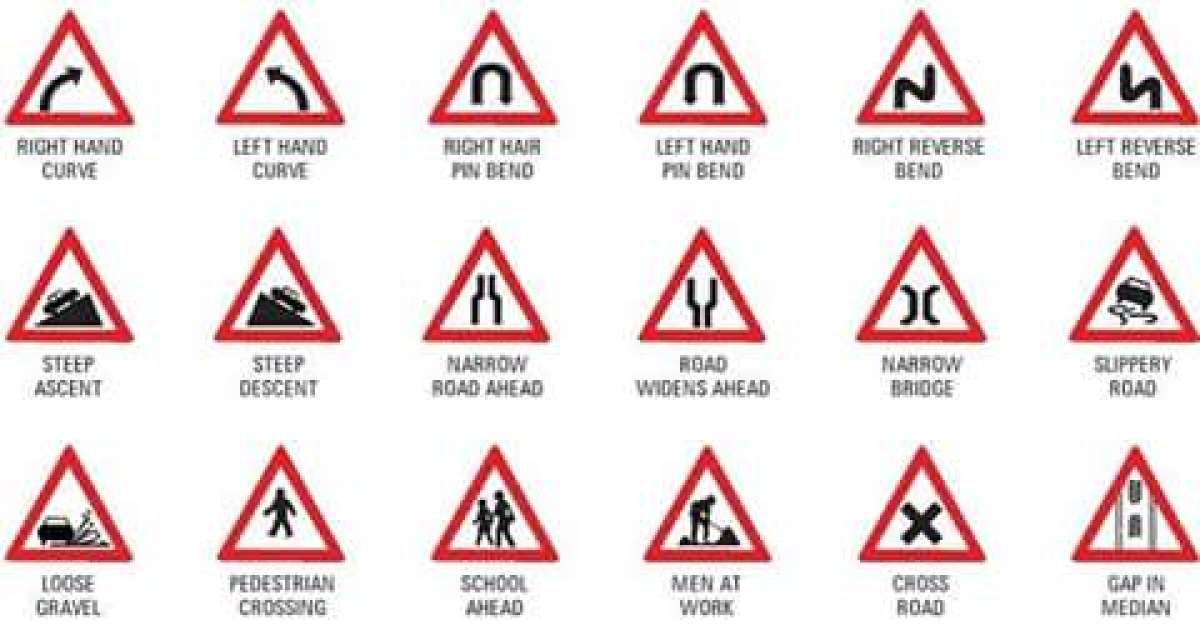
TRAFFIC LIGHTS
Traffic lights are unique light at road junction to control the flow of traffic. It has colours of green, red, and yellow.
The green light means go, the yellow means get ready to go while the red signifies stop.

CONSEQUENCES OF DISOBEYING TRAFFIC RULES.
1.ACCIDENT:- Road accidents occur as a result of disobeying traffic rules and regulations.

2.DEFORMITY , LOSS OF LIVES AND PROPERTY:-
When we do not obey traffic rules, it may lead to accident which may either kill, injure or deform the victims and damage their property.

3.TRAFFIC JAM:-
This usually occurs when we do not obey traffic rules . Sometime ,the traffic lights are neglected by vehicle and motorcycle drivers Nigeria.

4.MAN-HOUR LOSS:-
Disobedience to traffic rules could lead to delay,thereby depriving people from attending to their daily activities and appointments, resulting thereby in loss of time, money and other benefits to both private and public establishments.

EVALUATION:
1.Explain road signs and traffic rules
2.Mention three consequences of disobeying traffic rules
ASSIGNMENT: Read Solakat new syllabus on social studies for junior secondary schools. By A. Oluwasola Oyewole. pages 39-41.
further studies
http://www.mortgagecalculator.org/helpf ... safety.php
http://www.ehow.com/how_6363469_prevent ... chool.html
http://www.hkfsd.gov.hk/eng/source/safe ... ident.html
http://www.rospa.com/homesafety/advicea ... ldren.aspx
http://www.familylearning.org.uk/safety ... _home.html
CONTENT:
a) Meaning and examples of accidents in the home and schools.
b) Need for safety.
c) Safety measures in the home,school and workplace.
SUB-TOPIC 1
MEANING OF ACCIDENT
Accident can be defined as an unexpected occurrence that is capable of causing physical harm or damage.
Example of accidents in the home are:-
a) Hot water burns.
b) Fire outbreak
c) Falling down from the staircase
d) Bites from insects or snake.
e) Knife cut.
f) Bruises caused by hitting or knocking the body against an object.

EXAMPLES OF ACCIDENTS IN THE SCHOOL:
(1) Falling down while playing football
(2) Having a sprained ankle while missing a step.
(3) Injuries from sharp objects e.g. razor or bottles.
(4) Burns and scalds from hot chemicals in the laboratory.
(5) Falling down the stair case.

EVALUATION:
(1) What is an accident?
(2) State three examples of accident in the school.
SUB-TOPIC: 2
The Need For Safety:
Safety in the environment involves taking every precaution to ensure that the environment is safe for us to live in. Reasons for safety in the environment include the following:-
(i) A safe environment is a hazard-free environment.
(ii) To sustain the environment so that present and future generations can be supported by the environment.
(iii) To preserve natural beauty of our environment.
(iv) To reduce health-related risks in order to prolong life.
The need for safety is very important as it would to a large extent reduce the accident rates at home, school and working place.

EVALUATION:
Reading Assignment:
Read social studies for Nigerian junior secondary schools by E. Remi Aiyede.
Chapter 6, Pages 49-50.and Solakat new syllabus on social studies for junior secondary schools.by A.Oluwasola oyewole-chapter 6.pages 36-38.
Sub topic. 3
Safety Measures in the Home, School and workplace.
In order to minimize or eliminate accidents from home, the following general steps must be taken:
1. let your environment be clean and sparkling.
2. let there be ventilation all around the home.
3. inflammable objects and liquids must be kept away from home.
4. the use of candles and open lanterns must be discouraged to eliminate fire outbreak.
5. dangerous objects, drugs and medicine must be kept away from the reach of students.

SAFETY MEASURES AT HOME
1.The home and its surroundings should be kept clean always by sweeping the floor and clearing the bushes.
2.Dangerous household utensils such as knife and cutlass should be kept out of the reach of children.
3.Electrical faults should be handled by the experts.
4.Broken glasses,bottles and plastics should be carefully disposed by burying them.
5.The home should be well ventilated.
6.To prevent fire outbreak, the use of candle at home should be used with caution.
7.A generator should never be placed inside a house.
8.The drainage should be clean and unused water containers should be disposed off to avoid breeding of mosquitoes.
9.A well stocked first aid kit to deal with emergencies should be available.

SAFETY MEASURES AT SCHOOL
1.The school building must be well constructed with the right materials to prevent it from collapsing.
2. School laboratory should have apartments or cabinets where dangerous chemicals are kept and locked up. Students should be guided by a teacher during practical classes.
3. A well stocked first aid kit should be available in the school.
4.Students should be properly monitored during sporting activities by a sport specialists.
5.Physical fight between students should attract strict penalty and the students should be well informed about this.

SAFETY MEASURES AT WORK
The nature of safety measures at workplace depends on the produce of the company. The labour laws in Nigeria emphasize the need for safety measures at workplace.
1.Workers should be properly trained before handling any instrument that can cause bodily harm.
2.Naked light should be kept away from inflammable materials.
3.A factory or workplace should have a sfety manager.
4.Workers should be properly educated on safety measures peculiar to their work place.
5.Electrical works should be carefully done and handled by experts.
6. A worker should have a health care unit with a well stocked first aid kit and medical personnel

Assignment:
1) Accident occurs only at home and school True or False?
2) One of these cannot cause accident at home. (a) sharp object. (b) hot water (c) clean environment.(d)naked light
3) Bruises happen when ______________ (a) the body is knocked against an object. (b) hot water burns the skin. (c) sharp objects cut the body.(d)rain falls
4) One of these is a Safety measures at school---------(a)rain fall (b)singing in the school (c)a well stocked first aid kit should be available in the school.(b) none of the above.(c)all of the above.
Theory:
(1) List three causes of road accident.
(2) State two accidents at home.
(3) List 3 safety measures at school.
TOPIC: Traffic Rules and Regulation (a)meaning of road signs and traffic lights (b)consequences of disobeying traffic rules.
Sub-Topic:
1. Meaning of road signs and traffic lights.
2. Consequences of disobeying traffic rules.
MEANING OF ROAD SIGNS AND TRAFFIC RULES
Road signs are traffic signs that are constructed to control, inform and regulate the conduct of road users on the road.

Approaching a Narrow Bridge
Men at work
Road bent
Traffic Light
School children crossing
Stop
Highway

TRAFFIC LIGHTS
Traffic lights are unique light at road junction to control the flow of traffic. It has colours of green, red, and yellow.
The green light means go, the yellow means get ready to go while the red signifies stop.

CONSEQUENCES OF DISOBEYING TRAFFIC RULES.
1.ACCIDENT:- Road accidents occur as a result of disobeying traffic rules and regulations.

2.DEFORMITY , LOSS OF LIVES AND PROPERTY:-
When we do not obey traffic rules, it may lead to accident which may either kill, injure or deform the victims and damage their property.

3.TRAFFIC JAM:-
This usually occurs when we do not obey traffic rules . Sometime ,the traffic lights are neglected by vehicle and motorcycle drivers Nigeria.

4.MAN-HOUR LOSS:-
Disobedience to traffic rules could lead to delay,thereby depriving people from attending to their daily activities and appointments, resulting thereby in loss of time, money and other benefits to both private and public establishments.

EVALUATION:
1.Explain road signs and traffic rules
2.Mention three consequences of disobeying traffic rules
ASSIGNMENT: Read Solakat new syllabus on social studies for junior secondary schools. By A. Oluwasola Oyewole. pages 39-41.
further studies
http://www.mortgagecalculator.org/helpf ... safety.php
http://www.ehow.com/how_6363469_prevent ... chool.html
http://www.hkfsd.gov.hk/eng/source/safe ... ident.html
http://www.rospa.com/homesafety/advicea ... ldren.aspx
http://www.familylearning.org.uk/safety ... _home.html
WEEK 2
MAIN TOPIC: Accidents in the home and workplace.
SPECIFIC TOPIC: Road safety and traffic regulation.
REFERENCE BOOKS: Social Studies for Nigerian JSS Book 1, by Remi E. Aiyede Et al.
Basic Social Studies For Nigeria Secondary Schools by Anikpo et al. Simplified Social Studies for JSS by Ogunwale A.
PERFORMANCE OBJECTIVES: At the end of the lesson, the students
should be able to:
1. list reasons why road safety is necessary in Nigeria.
2. name the agencies in charge of road traffic in Nigeria.
3. explain causes of road accidents in Nigeria.
CONTENTS:
ROAD SAFETY AND TRAFFIC REGULATION.
Road transport is the most important and commonly used in Nigeria, because of this there is the need to effectively monitor it, due to the following reasons.
1. It is necessary to protect the motorists and pedestrians from avoidable accidents.
2. To serve as guide to motorists, residents in an area, markets, school and students.
3. To put signs on major roads to be able to direct the major road users.
4. To ensure there is no confusion on the roads.
5. To avoid accidents on the highways.

CAUSES OF ROAD ACCIDENTS.
1 Drinking while driving.
2. The use of second hand tyres.
3. The roads are very bad.
4. Absence of road signs.
5. Level of illiteracy among the drivers.
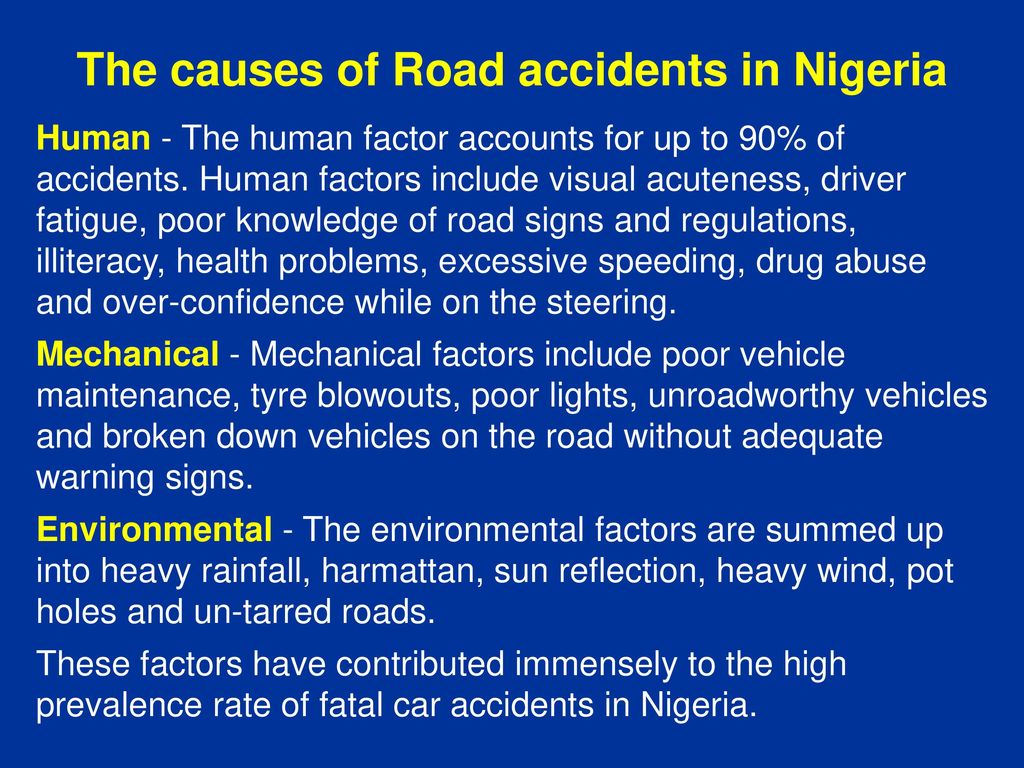
WAYS OF REDUCING ROAD ACCIDENTS.
1. Avoid drinking while driving.
2. Provision of road signs on our roads.
3. Enlightenment campaign for our drivers and other road users.
4. Banning of the use of second hand tyres.
5. Construction of good roads in Nigeria.

EVALUATION/ CLASSWORK:
1. List three reasons for road safety in Nigeria.
2. Name two agencies in charge of traffic in Nigeria.
3. Enumerate four causes of road mishap in Nigeria.
HOME WORK/ ASSIGNMENT:
1. List four causes of accidents you know in school.
2. List two ways by which these accidents can be controlled.
further studies
http://safelyhome.westerncape.gov.za/road-safety
http://admis.hp.nic.in/transport/roadSafety.aspx
http://frsc.gov.ng/
LESSON 24
MAIN TOPIC: SOCIALIZATION.
SPECIFIC TOPIC: MEANING OF SOCIALIZATION.
REFERENCE BOOKS: Social Studies for Nigerian JSS Book 1, by Remi E. Aiyede Et al. Basic Social Studies
For Nigeria Secondary Schools by Anikpo et al. Simplified Social Studies for
JSS by Ogunwale A.
PERFORMANCE OBJECTIVES: At the end of the lesson, the students
should be able to:
1. define socialization.
2. list the forms of socialization.
CONTENTS:
MEANING OF SOCIALIZATION.
Socialization is the process of social integration, making individual members of the society become tolerant and understanding towards one another.
It is also the process by which individuals learn the culture of their society through daily and continuous contact and social interaction with other human beings. Socialization is also known as ECULTURATION by Sociologists.
Man learns from birth to death, and so it is a process of lifetime. As soon as a person is born into a family, he or she has started socializing with the family. It is here the child will receive primary socialization.
Sometimes learning is fun, as when we learn a new sport, art or musical technique from a friend. At other times, the learning may not be so much fun. E.g. when we have to perform our share of a duty, even when we do not feel like doing it.
The second form of socialization is the adult socialization i.e. the adult receives interact and socialize with children who are just coming into the world. Adults also socialize with adults.
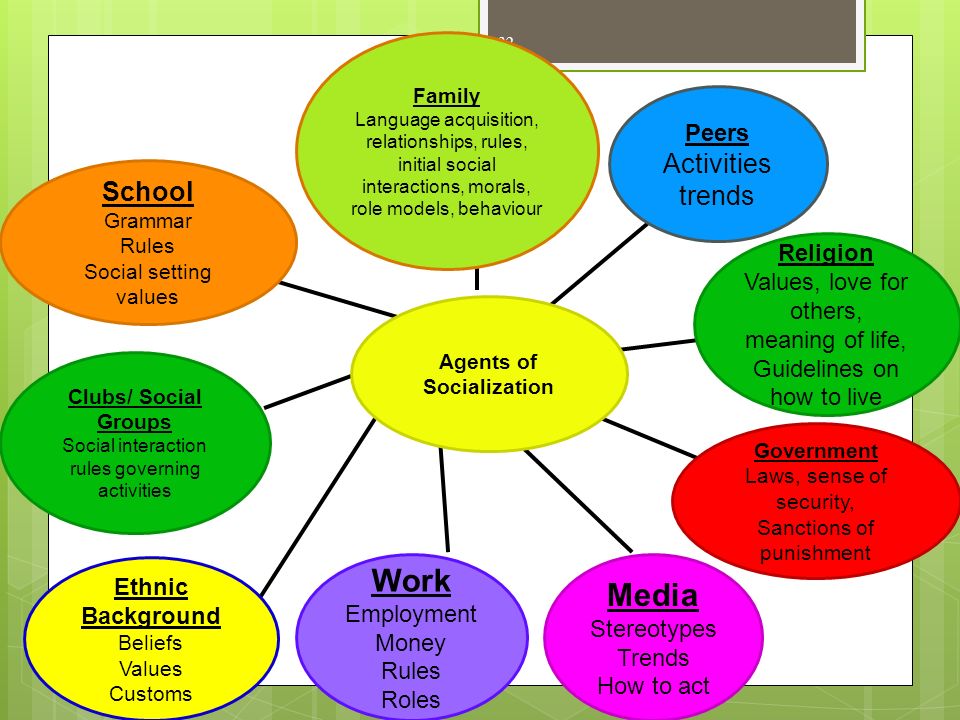
EVALUATION/ CLASSWORK:
What is socialization?
2. Write out and define the two types of socialization.
HOME WORK/ ASSIGNMENT: Differentiate between primary and adult socialization.
further studies
http://kccesl.tripod.com/hypertextstudy/printtext.html
SPECIFIC TOPIC: Road safety and traffic regulation.
REFERENCE BOOKS: Social Studies for Nigerian JSS Book 1, by Remi E. Aiyede Et al.
Basic Social Studies For Nigeria Secondary Schools by Anikpo et al. Simplified Social Studies for JSS by Ogunwale A.
PERFORMANCE OBJECTIVES: At the end of the lesson, the students
should be able to:
1. list reasons why road safety is necessary in Nigeria.
2. name the agencies in charge of road traffic in Nigeria.
3. explain causes of road accidents in Nigeria.
CONTENTS:
ROAD SAFETY AND TRAFFIC REGULATION.
Road transport is the most important and commonly used in Nigeria, because of this there is the need to effectively monitor it, due to the following reasons.
1. It is necessary to protect the motorists and pedestrians from avoidable accidents.
2. To serve as guide to motorists, residents in an area, markets, school and students.
3. To put signs on major roads to be able to direct the major road users.
4. To ensure there is no confusion on the roads.
5. To avoid accidents on the highways.

CAUSES OF ROAD ACCIDENTS.
1 Drinking while driving.
2. The use of second hand tyres.
3. The roads are very bad.
4. Absence of road signs.
5. Level of illiteracy among the drivers.

WAYS OF REDUCING ROAD ACCIDENTS.
1. Avoid drinking while driving.
2. Provision of road signs on our roads.
3. Enlightenment campaign for our drivers and other road users.
4. Banning of the use of second hand tyres.
5. Construction of good roads in Nigeria.

EVALUATION/ CLASSWORK:
1. List three reasons for road safety in Nigeria.
2. Name two agencies in charge of traffic in Nigeria.
3. Enumerate four causes of road mishap in Nigeria.
HOME WORK/ ASSIGNMENT:
1. List four causes of accidents you know in school.
2. List two ways by which these accidents can be controlled.
further studies
http://safelyhome.westerncape.gov.za/road-safety
http://admis.hp.nic.in/transport/roadSafety.aspx
http://frsc.gov.ng/
LESSON 24
MAIN TOPIC: SOCIALIZATION.
SPECIFIC TOPIC: MEANING OF SOCIALIZATION.
REFERENCE BOOKS: Social Studies for Nigerian JSS Book 1, by Remi E. Aiyede Et al. Basic Social Studies
For Nigeria Secondary Schools by Anikpo et al. Simplified Social Studies for
JSS by Ogunwale A.
PERFORMANCE OBJECTIVES: At the end of the lesson, the students
should be able to:
1. define socialization.
2. list the forms of socialization.
CONTENTS:
MEANING OF SOCIALIZATION.
Socialization is the process of social integration, making individual members of the society become tolerant and understanding towards one another.
It is also the process by which individuals learn the culture of their society through daily and continuous contact and social interaction with other human beings. Socialization is also known as ECULTURATION by Sociologists.
Man learns from birth to death, and so it is a process of lifetime. As soon as a person is born into a family, he or she has started socializing with the family. It is here the child will receive primary socialization.
Sometimes learning is fun, as when we learn a new sport, art or musical technique from a friend. At other times, the learning may not be so much fun. E.g. when we have to perform our share of a duty, even when we do not feel like doing it.
The second form of socialization is the adult socialization i.e. the adult receives interact and socialize with children who are just coming into the world. Adults also socialize with adults.

EVALUATION/ CLASSWORK:
What is socialization?
2. Write out and define the two types of socialization.
HOME WORK/ ASSIGNMENT: Differentiate between primary and adult socialization.
further studies
http://kccesl.tripod.com/hypertextstudy/printtext.html
WEEK 3
MAIN TOPIC: SIGNIFICANCE OF SOCIALIZATION.
REFERENCE BOOKS: Social Studies for Nigerian JSS Book 1, by Remi E. Aiyede Et al. Basic Social Studies
For Nigeria Secondary Schools by Anikpo et al. Simplified Social Studies for
JSS by Ogunwale A.
PERFORMANCE OBJECTIVES: At the end of the lesson, the students should be able to:
1. explain the significance of socialization.
2. explain childhood and adulthood socialization.
CONTENTS:
OBJECTIVES OF SOCIALIZATION.
Socialization in the society has the following objectives.
1. To make the behavior of the new members of a group to conform to the behavior of that group.
2. It aims at preparing children and adults to be able to know the culture of the society. They do this by learning the culture of the society. They can learn the way people dress. The rules and regulations, and the language of the people.
3. It aims at making the individuals to become a good member of the society.
4. Socialization makes one aware of oneself, knowledgeable and skilled in the ways of a given culture and environment.
5. It helps the individuals in the society learn how to play their roles effectively and meaningfully in order to ensure the continuous existence of the society.
CHILDHOOD SOCIALIZATION
This take place in the family. This stage is very important because the success of the secondary socialization depends largely on it. At this stage, the child acquires good morals, habits, values and attitude, all of which help him to fit properly into the society.
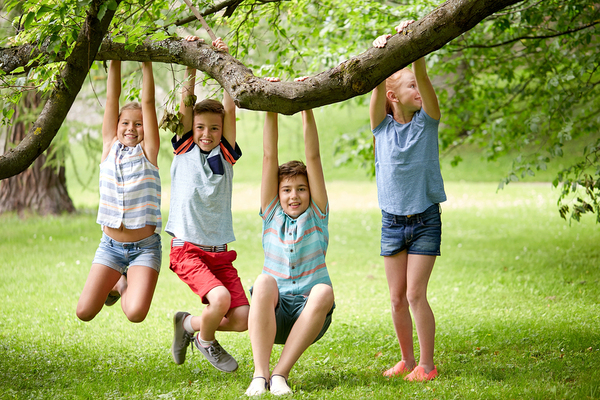
ADULTHOOD SOCIALIZATION.
This sets in later in one's life like in the school, church or mosque. It is the continuation of childhood socialization. Some people who are not properly trained initially are retrained or re-socialized. This may however involve the prison, school or religious institutions.

EVALUATION/ CLASSWORK:
1. List four significance of socialization to the society.
2. Explain briefly childhood socialization and adulthood socialization.
ASSIGNMENT:
List four organizations that are in charge of socialization in Nigeria.
LESSON 26
SPECIFIC TOPIC: PROCESSES OF SOCIALIZATION.
REFERENCE BOOK S: Social Studies for Nigerian JSS Book 1, by Remi E. Aiyede Et al. Basic Social Studies for Nigeria Secondary Schools by Anikpo et al. Simplified Social Studies for JSS by Ogunwale A.
PERFORMANCE OBJECTIVES: At the end of the lesson, the students should be able to:
1. list the processes of socialization.
2. explain the processes of socialization.
CONTENTS:
PROCESSES OF SOCIALIZATION.
Socialization is a long life process and it dictates how a person behaves in a society. Processes involved can be divided into two.
A. NATURAL or PLANNED. These are the ones that are being taught from infant. It is from what is happening in their society that they learn from. It may also be that they are able to see, teach and feel in the society. It may be good or bad.
B. POSITIVE or NEGATIVE. Positive socialization is the type of social learning that is comfortable or exiciting. It makes us to like those who are in charge of teaching us. It encourages us, to care for others and give valuable information about life.
Negative on the other hand, occurs when others use punishment, anger to try to teach us a lesson. It may make one to have hatred for some things in life and even have bad judgement effect on particular issues or subjects.
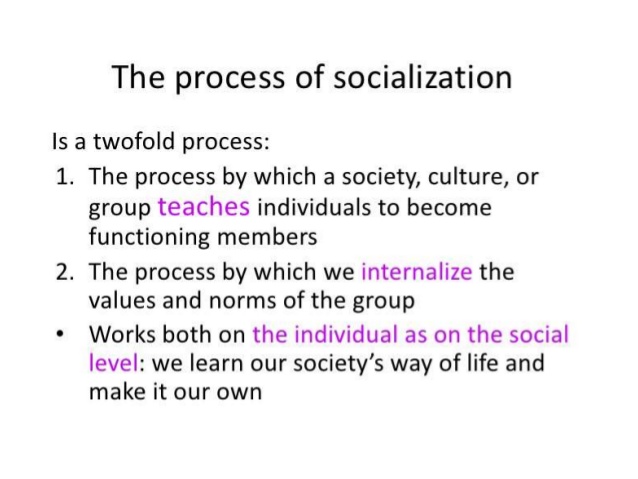
EVALUATION/ CLASSWORK:
1. List the processes of socialization you have been taught.
2. Explain briefly the processes involved in socialization.
HOME WORK/ ASSIGNMENT:
List five agencies in Nigeria that involve in socialization processes.
further studies
http://www.preservearticles.com/2011022 ... -life.html
http://anthro.palomar.edu/social/soc_1.htm
http://en.wikibooks.org/wiki/Introducti ... ialization
http://www.chegg.com/homework-help/defi ... ization-49
SPECIFIC TOPIC: PROCESSES OF SOCIALIZATION.
REFERENCE BOOK : Social Studies for Nigerian JSS Book 1, by Remi E. Aiyede Et al. Basic Social Studies For Nigeria Secondary Schools by Anikpo et al. Simplified Social Studies for JSS by Ogunwale A.
PERFORMANCE OBJECTIVES: At the end of the lesson, the students should be able to:
1.list and explain the process of socialization.
CONTENTS:
PROCESSES OF SOCIALIZATION.
Socialization may be achieved through the process of Western type of education, which is received through the school system. The four processes through which socialization is achieved are:
1. direct learning.
2. incidental learning.
3. learning from model.
4. role learning.
DIRECT LEARNING. This occurs when a child learn under a consciously- planned teaching and learning condition in the classroom or elsewhere.
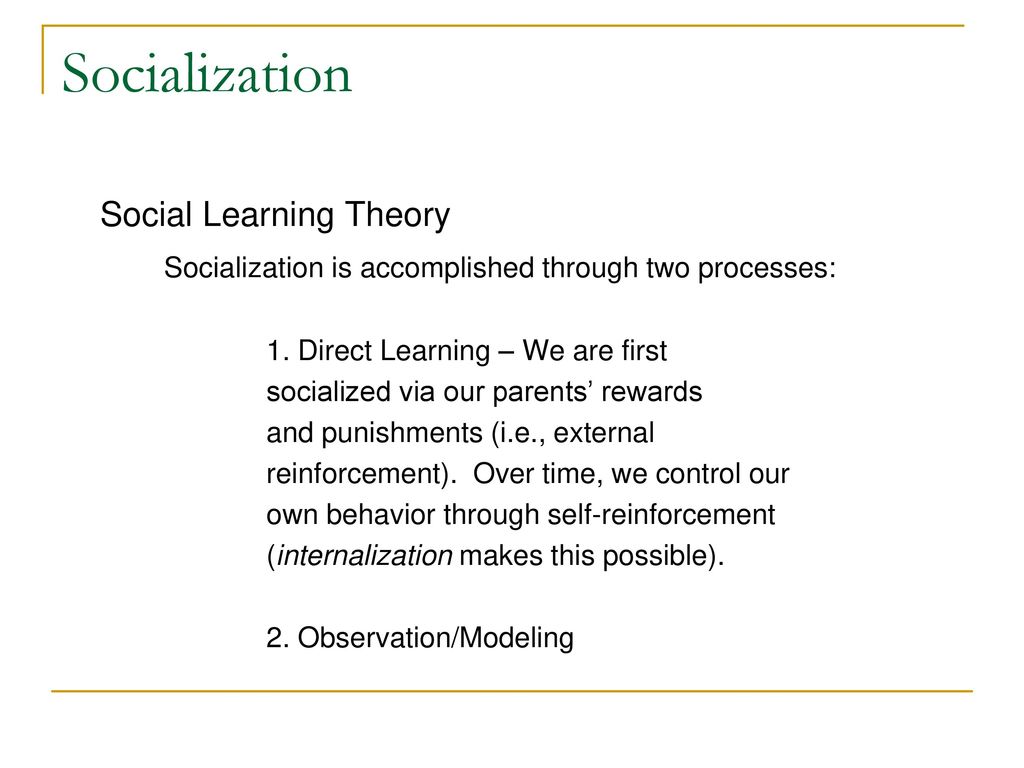
INCIDENTAL LEARNING. This occurs when a child learns from things that are not planned or intended to occur. Some of the things learnt under incidental learning may or may not be desired.
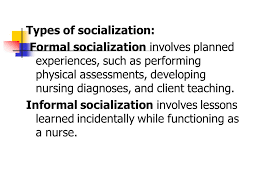
LEARNING FROM MODELS. This occurs when a child or a mature individuals learns by observing and imitating people around him.e.g. a child may learn from his/her parents, teachers and friends through observation and imitation.
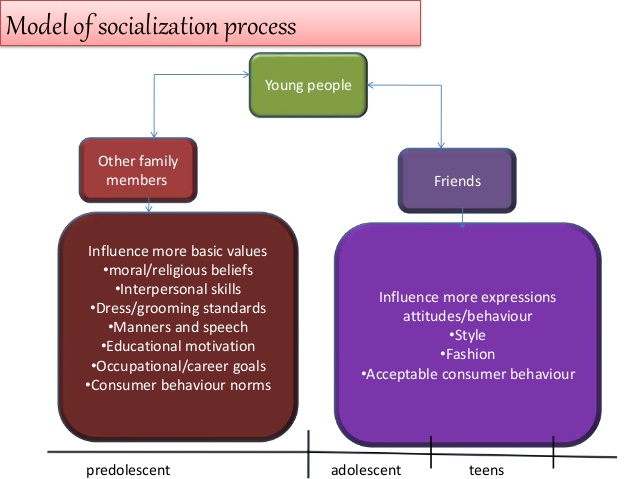
ROLE LEARNING. This is when an individual learns to perform the duties assigned to him in the society; we say that socialization has taken place through the process of role learning.
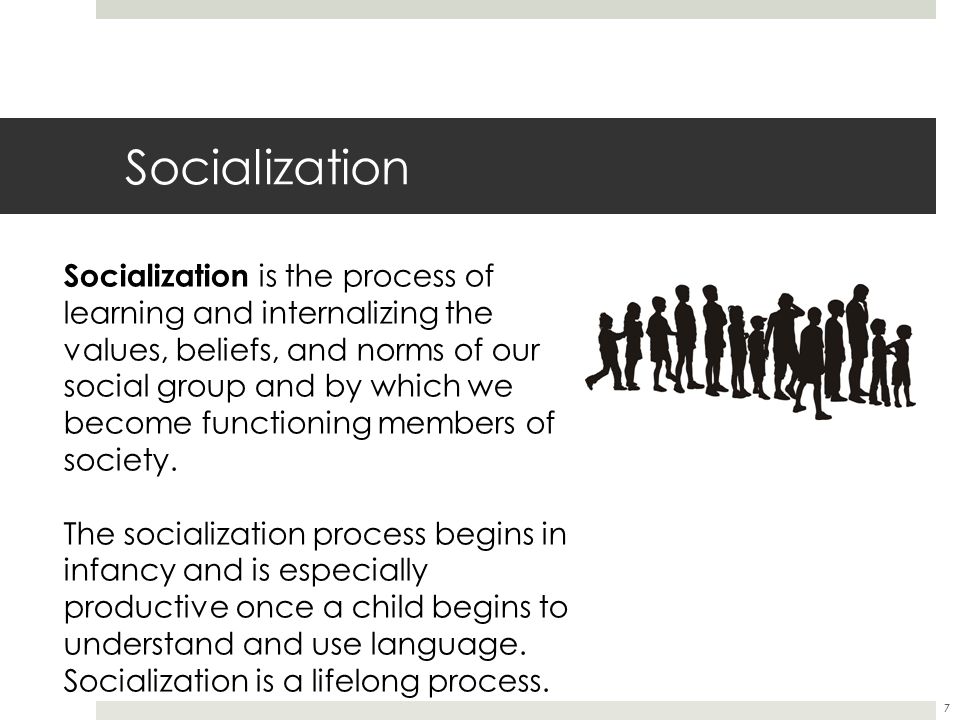
The learning processes examined above can be imbibed through the following ways:
1. information.
2. instruction.
3. practice.
4. indoctrination.
5. imitation.
6. preaching.
7.habituation.
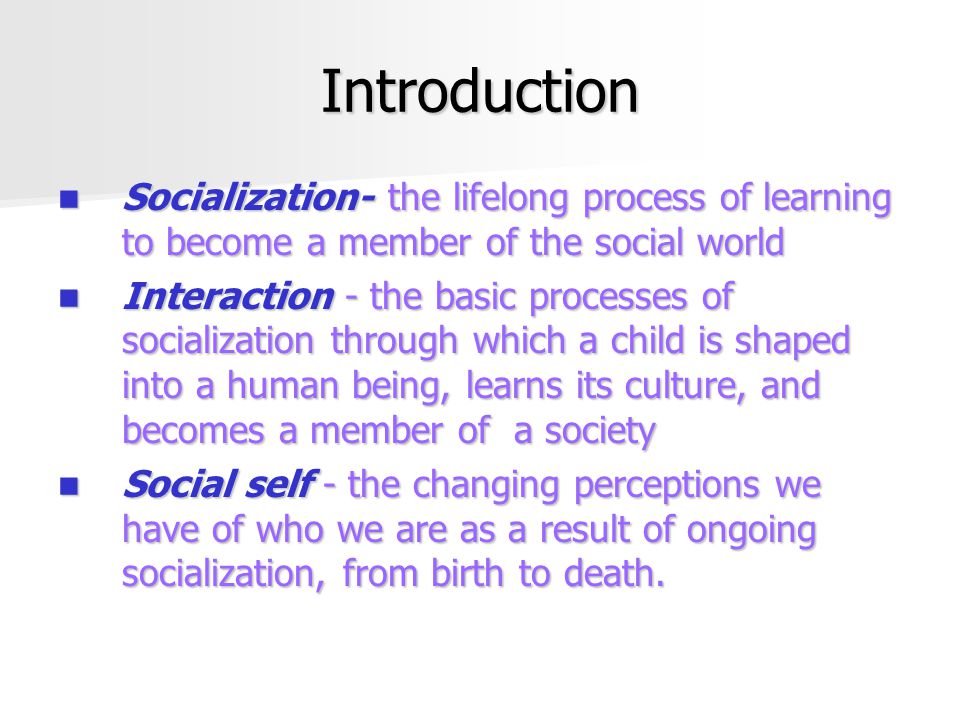
EVALUATION/ CLASSWORK :
1. List the processes of socialization you know.
2. Explain three of the processes mentioned above.
ASSIGNMENT: .
Write short note on: 1. information. 2. Instruction. 3. Preaching. 4. Practice.
further studies
http://cdenglish.blogspot.com/2010/09/r ... ss-of.html
http://www.preservearticles.com/2011022 ... ation.html
LESSON 28
SPECIFIC TOPIC: AGENTS OF SOCIALIZATION.
REFERENCE BOOKS: Social Studies for Nigerian JSS Book 1, by Remi E. Aiyede Et al. Basic Social Studies for Nigeria Secondary Schools by Anikpo et al. Simplified Social Studies for JSS by Ogunwale A.
PERFORMANCE OBJECTIVES: At the end of the lesson, the students should be able to:
1. list the agents of socialization. .
2. explain the agents of socialization.
CONTENTS:
AGENTS OF SOCIALIZATION.
The agents of socialization refer to the various places where socialization takes place. The agents of socialization are the following.
1. THE FAMILY. This is the first agent of socialization of the child. The family comprises of the belief, the food, language, greetings and interaction.
Family composition and relationship with children will determine the extent of success of socialization.
It is the primary agent of socialization; since we all know that every child is born into a family. The socialized adult members of the family teach the child the language, basic values such as how to speak to elders etc.
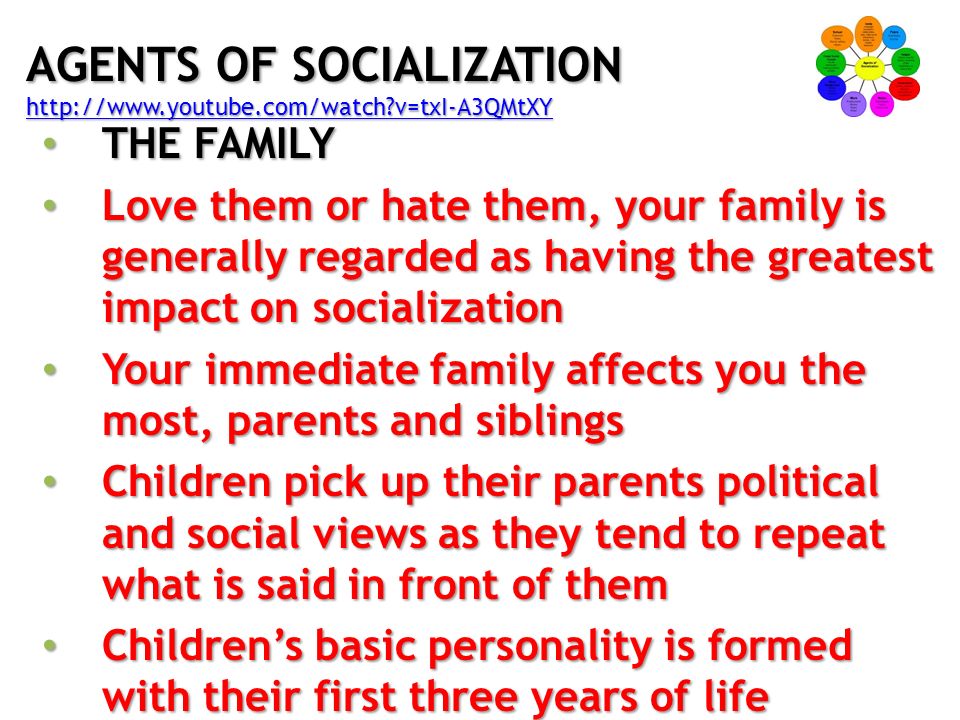
2. THE SCHOOL. The school is where more learning takes place and the teachers are specially trained to perform the following duties: impact technical knowledge and skills, help the child to acquire the right attitudes and values, instill discipline in the individual, act as models to the pupils and help to develop the habit of the role playing in the child.
The process of socialization which began at home continues at school. At school, the child is given an all-round education in physical development(psychomotor),attitudinal development(affective)and intellectual development(cognitive).
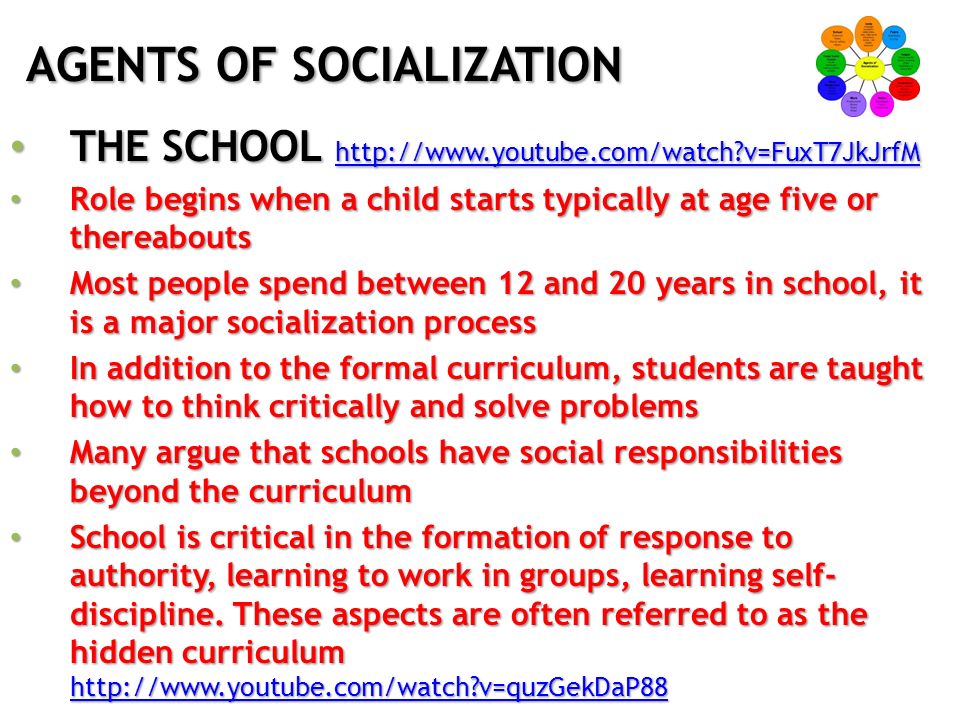
3. THE PEER GROUP. This will include classmates, friends and colleagues. They assist in molding the character of members of their groups in academics, behaviuor, neatness and the other way round. As a child grows up, he attends school and plays with his age group. These playmates or peer groups have their own rules and regulations which members must obey. eg A child learns how to behave in a group.
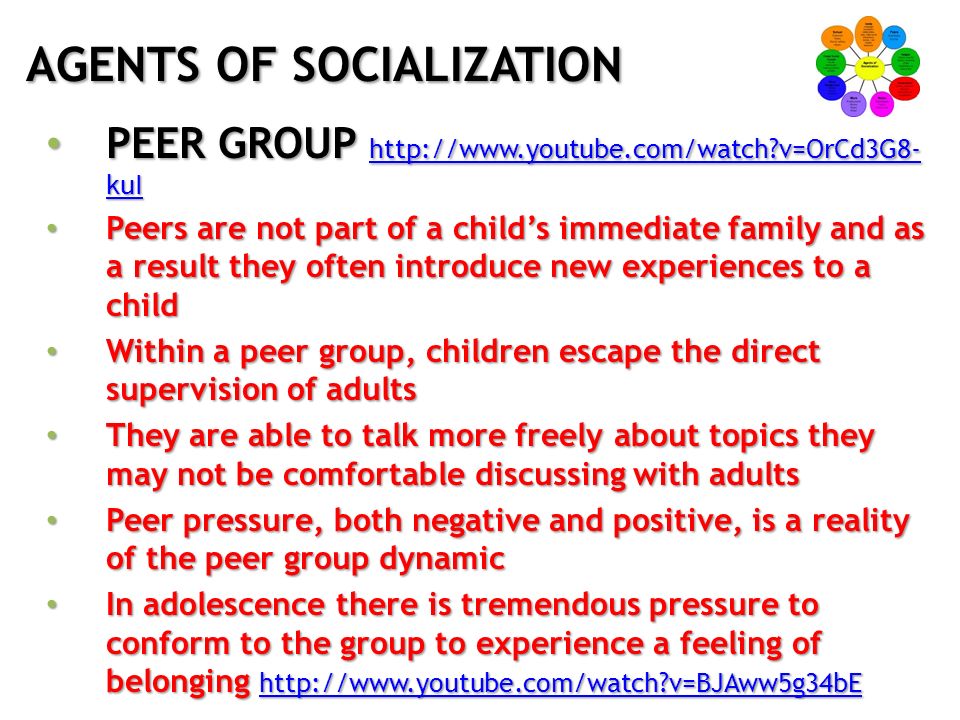
4. THE MASS MEDIA. This will include the radio, television, internet, newspapers e.t.c. It allows people to learn through it by reading listening and watching. All these increase the awareness of children and adults about what is happening around them and all over the world.
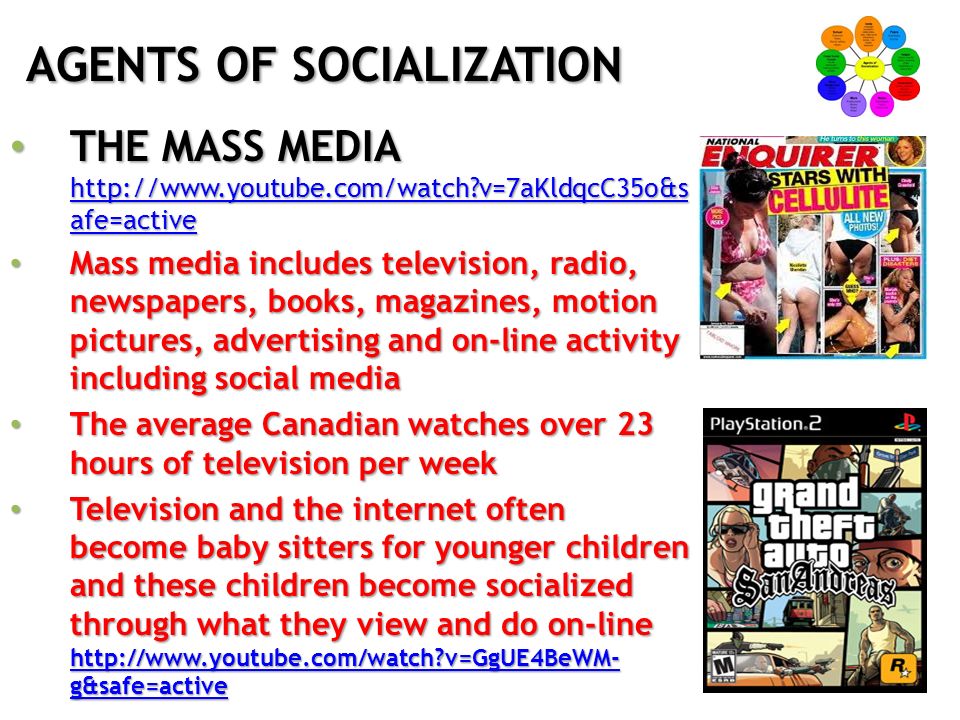
5. RELIGIOUS INSTITUTIONS. These institutions socialize through sermons and teachings, they help in reforming people, promote peace, justice, charity and spread of message of God Almighty. Through religious institution, the members are taught desirable values such as love, faithfulness, honesty. etc.
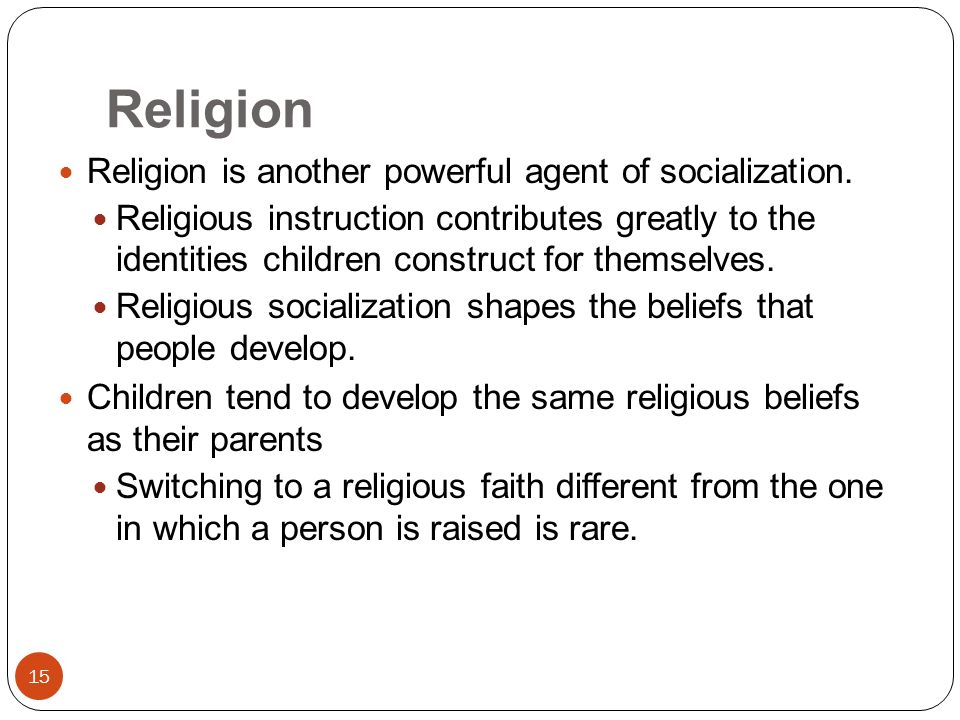
6. AGE GROUP: In any traditional society, age group is the most important agency of socialization.
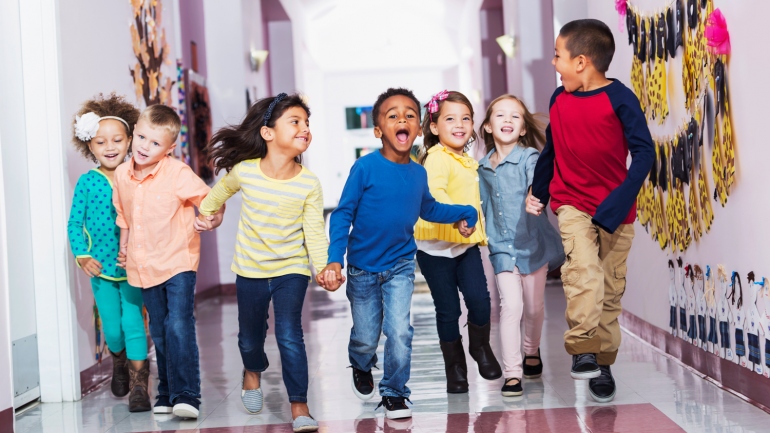
7. THE COMMUNITY: The community defines the acceptable ways by which members should behave. It praises and honors those who obey its rules and regulations while those who disobeyed are disgraced and punished.

8. VOLUNTARY ORGANIZATION: These include Red Cross, boy brigade, and rotary club. Etc. They impact certain skills and values on its members.

EVALUATION/ CLASSWORK:
1. List the agents of socialization you>ve been taught.
2. Explain these agents of socialization mentioned above.
HOME WORK/ ASSIGNMENT:
By what process can one be socialized?
further studies
http://www.slideshare.net/MeeliiV/agent ... ialization
SUB-TOPIC 2: EFFECTS OF SOCIALIZATION
The quality of each agent of socialization such as family, peer group, the school etc, largely determines the effects of socialization on the people. It may be of negative or positive effects.
POSITIVE EFFECTS OR IMPORTANCE OF SOCIALIZATION
1. It enables the individual to play their roles in the society.
2. It inculcates a sense of discipline on individual in the society.
3. It inculcates in individual a sense of moral responsibility.
4. It develops a communal spirit in individual
5. It enables individual to learn and appreciate his culture and other cultures.
6. It helps us to learn from one another.
7. It ensures the transmission of our culture from one generation to another.
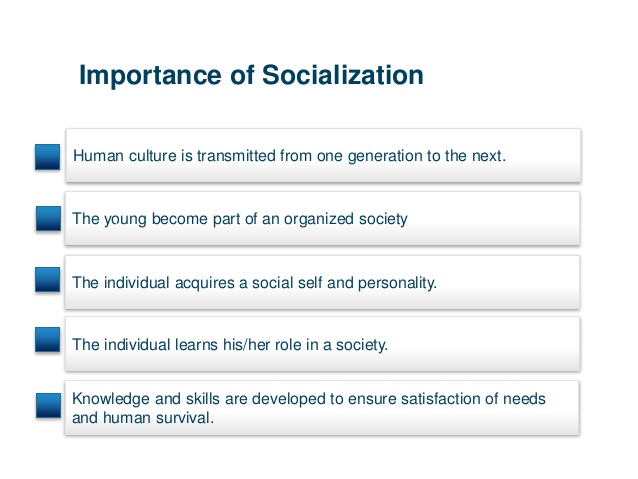
NEGATIVE EFFECTS OR DISADVANTAGES OF SOCIALIZATION
Displaying of negative values by the mass media has made some individual become morally irresponsible.
1. Negative peer pressure has increased crime rate in the society.
2. Acculturation through over-dependent on western culture
3. Infiltration of negative influences such as pornography through the internet.
4. A morally backward community tends to produce immoral citizen.
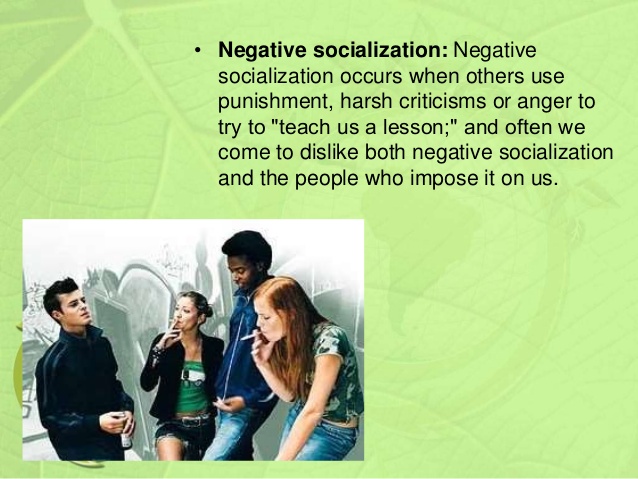
EVALUATION
1. List five positive effects of socialization.
2. Mention at least three negative effects of socialization.
READING ASSIGNMENT
Read chapter 3 of Social Studies for Junior Secondary School by A, Oluwasola Oyewole Pages 43-46
ASSIGNMENT
OBJECTIVES QUESTIONS:
1. The ways a persons is socialized into the community are called_________
(a)Agents of socialization ( b). social environment ( c). family life.(d) religious activities
2. The primary agent of socialization is called _________
(a)Mass media( b). family( c). school.(d)society
3. Negative peer pressure has increased crime rate in the society. TRUE OR FALSE.
4. __________ inculcates a sense of moral responsibility.
(a)Responsibility( b). socialization( c). none of the above.(d)relationship
5. Examples of voluntary organizations are the followings except:
(a)Red cross( b). Boys brigade( c). Newspapers.(d) rotary club.
ESSAY QUESTIONS:
1. Mention five importance of socialization
2. List 4 disadvantages of socialization
3. Name all the agents of socialization that you have been taught and explain 5 of them.
REFERENCE BOOKS: Social Studies for Nigerian JSS Book 1, by Remi E. Aiyede Et al. Basic Social Studies
For Nigeria Secondary Schools by Anikpo et al. Simplified Social Studies for
JSS by Ogunwale A.
PERFORMANCE OBJECTIVES: At the end of the lesson, the students should be able to:
1. explain the significance of socialization.
2. explain childhood and adulthood socialization.
CONTENTS:
OBJECTIVES OF SOCIALIZATION.
Socialization in the society has the following objectives.
1. To make the behavior of the new members of a group to conform to the behavior of that group.
2. It aims at preparing children and adults to be able to know the culture of the society. They do this by learning the culture of the society. They can learn the way people dress. The rules and regulations, and the language of the people.
3. It aims at making the individuals to become a good member of the society.
4. Socialization makes one aware of oneself, knowledgeable and skilled in the ways of a given culture and environment.
5. It helps the individuals in the society learn how to play their roles effectively and meaningfully in order to ensure the continuous existence of the society.
CHILDHOOD SOCIALIZATION
This take place in the family. This stage is very important because the success of the secondary socialization depends largely on it. At this stage, the child acquires good morals, habits, values and attitude, all of which help him to fit properly into the society.

ADULTHOOD SOCIALIZATION.
This sets in later in one's life like in the school, church or mosque. It is the continuation of childhood socialization. Some people who are not properly trained initially are retrained or re-socialized. This may however involve the prison, school or religious institutions.

EVALUATION/ CLASSWORK:
1. List four significance of socialization to the society.
2. Explain briefly childhood socialization and adulthood socialization.
ASSIGNMENT:
List four organizations that are in charge of socialization in Nigeria.
LESSON 26
SPECIFIC TOPIC: PROCESSES OF SOCIALIZATION.
REFERENCE BOOK S: Social Studies for Nigerian JSS Book 1, by Remi E. Aiyede Et al. Basic Social Studies for Nigeria Secondary Schools by Anikpo et al. Simplified Social Studies for JSS by Ogunwale A.
PERFORMANCE OBJECTIVES: At the end of the lesson, the students should be able to:
1. list the processes of socialization.
2. explain the processes of socialization.
CONTENTS:
PROCESSES OF SOCIALIZATION.
Socialization is a long life process and it dictates how a person behaves in a society. Processes involved can be divided into two.
A. NATURAL or PLANNED. These are the ones that are being taught from infant. It is from what is happening in their society that they learn from. It may also be that they are able to see, teach and feel in the society. It may be good or bad.
B. POSITIVE or NEGATIVE. Positive socialization is the type of social learning that is comfortable or exiciting. It makes us to like those who are in charge of teaching us. It encourages us, to care for others and give valuable information about life.
Negative on the other hand, occurs when others use punishment, anger to try to teach us a lesson. It may make one to have hatred for some things in life and even have bad judgement effect on particular issues or subjects.

EVALUATION/ CLASSWORK:
1. List the processes of socialization you have been taught.
2. Explain briefly the processes involved in socialization.
HOME WORK/ ASSIGNMENT:
List five agencies in Nigeria that involve in socialization processes.
further studies
http://www.preservearticles.com/2011022 ... -life.html
http://anthro.palomar.edu/social/soc_1.htm
http://en.wikibooks.org/wiki/Introducti ... ialization
http://www.chegg.com/homework-help/defi ... ization-49
SPECIFIC TOPIC: PROCESSES OF SOCIALIZATION.
REFERENCE BOOK : Social Studies for Nigerian JSS Book 1, by Remi E. Aiyede Et al. Basic Social Studies For Nigeria Secondary Schools by Anikpo et al. Simplified Social Studies for JSS by Ogunwale A.
PERFORMANCE OBJECTIVES: At the end of the lesson, the students should be able to:
1.list and explain the process of socialization.
CONTENTS:
PROCESSES OF SOCIALIZATION.
Socialization may be achieved through the process of Western type of education, which is received through the school system. The four processes through which socialization is achieved are:
1. direct learning.
2. incidental learning.
3. learning from model.
4. role learning.
DIRECT LEARNING. This occurs when a child learn under a consciously- planned teaching and learning condition in the classroom or elsewhere.

INCIDENTAL LEARNING. This occurs when a child learns from things that are not planned or intended to occur. Some of the things learnt under incidental learning may or may not be desired.

LEARNING FROM MODELS. This occurs when a child or a mature individuals learns by observing and imitating people around him.e.g. a child may learn from his/her parents, teachers and friends through observation and imitation.

ROLE LEARNING. This is when an individual learns to perform the duties assigned to him in the society; we say that socialization has taken place through the process of role learning.

The learning processes examined above can be imbibed through the following ways:
1. information.
2. instruction.
3. practice.
4. indoctrination.
5. imitation.
6. preaching.
7.habituation.

EVALUATION/ CLASSWORK :
1. List the processes of socialization you know.
2. Explain three of the processes mentioned above.
ASSIGNMENT: .
Write short note on: 1. information. 2. Instruction. 3. Preaching. 4. Practice.
further studies
http://cdenglish.blogspot.com/2010/09/r ... ss-of.html
http://www.preservearticles.com/2011022 ... ation.html
LESSON 28
SPECIFIC TOPIC: AGENTS OF SOCIALIZATION.
REFERENCE BOOKS: Social Studies for Nigerian JSS Book 1, by Remi E. Aiyede Et al. Basic Social Studies for Nigeria Secondary Schools by Anikpo et al. Simplified Social Studies for JSS by Ogunwale A.
PERFORMANCE OBJECTIVES: At the end of the lesson, the students should be able to:
1. list the agents of socialization. .
2. explain the agents of socialization.
CONTENTS:
AGENTS OF SOCIALIZATION.
The agents of socialization refer to the various places where socialization takes place. The agents of socialization are the following.
1. THE FAMILY. This is the first agent of socialization of the child. The family comprises of the belief, the food, language, greetings and interaction.
Family composition and relationship with children will determine the extent of success of socialization.
It is the primary agent of socialization; since we all know that every child is born into a family. The socialized adult members of the family teach the child the language, basic values such as how to speak to elders etc.

2. THE SCHOOL. The school is where more learning takes place and the teachers are specially trained to perform the following duties: impact technical knowledge and skills, help the child to acquire the right attitudes and values, instill discipline in the individual, act as models to the pupils and help to develop the habit of the role playing in the child.
The process of socialization which began at home continues at school. At school, the child is given an all-round education in physical development(psychomotor),attitudinal development(affective)and intellectual development(cognitive).

3. THE PEER GROUP. This will include classmates, friends and colleagues. They assist in molding the character of members of their groups in academics, behaviuor, neatness and the other way round. As a child grows up, he attends school and plays with his age group. These playmates or peer groups have their own rules and regulations which members must obey. eg A child learns how to behave in a group.

4. THE MASS MEDIA. This will include the radio, television, internet, newspapers e.t.c. It allows people to learn through it by reading listening and watching. All these increase the awareness of children and adults about what is happening around them and all over the world.

5. RELIGIOUS INSTITUTIONS. These institutions socialize through sermons and teachings, they help in reforming people, promote peace, justice, charity and spread of message of God Almighty. Through religious institution, the members are taught desirable values such as love, faithfulness, honesty. etc.

6. AGE GROUP: In any traditional society, age group is the most important agency of socialization.

7. THE COMMUNITY: The community defines the acceptable ways by which members should behave. It praises and honors those who obey its rules and regulations while those who disobeyed are disgraced and punished.

8. VOLUNTARY ORGANIZATION: These include Red Cross, boy brigade, and rotary club. Etc. They impact certain skills and values on its members.

EVALUATION/ CLASSWORK:
1. List the agents of socialization you>ve been taught.
2. Explain these agents of socialization mentioned above.
HOME WORK/ ASSIGNMENT:
By what process can one be socialized?
further studies
http://www.slideshare.net/MeeliiV/agent ... ialization
SUB-TOPIC 2: EFFECTS OF SOCIALIZATION
The quality of each agent of socialization such as family, peer group, the school etc, largely determines the effects of socialization on the people. It may be of negative or positive effects.
POSITIVE EFFECTS OR IMPORTANCE OF SOCIALIZATION
1. It enables the individual to play their roles in the society.
2. It inculcates a sense of discipline on individual in the society.
3. It inculcates in individual a sense of moral responsibility.
4. It develops a communal spirit in individual
5. It enables individual to learn and appreciate his culture and other cultures.
6. It helps us to learn from one another.
7. It ensures the transmission of our culture from one generation to another.

NEGATIVE EFFECTS OR DISADVANTAGES OF SOCIALIZATION
Displaying of negative values by the mass media has made some individual become morally irresponsible.
1. Negative peer pressure has increased crime rate in the society.
2. Acculturation through over-dependent on western culture
3. Infiltration of negative influences such as pornography through the internet.
4. A morally backward community tends to produce immoral citizen.

EVALUATION
1. List five positive effects of socialization.
2. Mention at least three negative effects of socialization.
READING ASSIGNMENT
Read chapter 3 of Social Studies for Junior Secondary School by A, Oluwasola Oyewole Pages 43-46
ASSIGNMENT
OBJECTIVES QUESTIONS:
1. The ways a persons is socialized into the community are called_________
(a)Agents of socialization ( b). social environment ( c). family life.(d) religious activities
2. The primary agent of socialization is called _________
(a)Mass media( b). family( c). school.(d)society
3. Negative peer pressure has increased crime rate in the society. TRUE OR FALSE.
4. __________ inculcates a sense of moral responsibility.
(a)Responsibility( b). socialization( c). none of the above.(d)relationship
5. Examples of voluntary organizations are the followings except:
(a)Red cross( b). Boys brigade( c). Newspapers.(d) rotary club.
ESSAY QUESTIONS:
1. Mention five importance of socialization
2. List 4 disadvantages of socialization
3. Name all the agents of socialization that you have been taught and explain 5 of them.
WEEK 4
TOPIC: CULTURE
CONTENT:1. Meaning of culture
2. Components of culture-material and non-material culture
Meaning of culture
Culture is the total way of life of a group of people that distinguishes them from others. It includes people’s beliefs, their works of art and craft, the language they speak, the tools they make, their ways of dressing, the technology they develop and the various institutions they set up to achieve societal goals.
Culture is not static, but dynamic. In other words, it does not remain the same forever but changes from time to time. It is a continuous process. It is transmitted from one generation to another. People learn their culture as they perform new roles as pupils or students in a school, a father at home or as a president of a country.
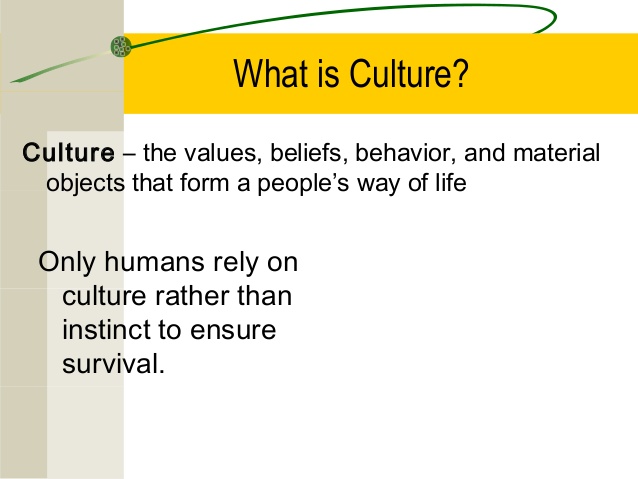
Components of Culture:
There are two components or aspects of culture. They are:
1. Material Aspect of Culture: This consists mainly of those things that are made by a society in order to satisfy the needs of its people. Examples are houses for shelter and protection; the tools for agriculture; the weapons for hunting and protection; the cloth and clothes made to suit the conditions of the environment; and the work of art and craft.
2. Non-Material Aspect of Culture: This aspect of culture consists of those things we cannot see like religion, music, language, morals, values, folklores, literature, dancing styles, technology, etc.
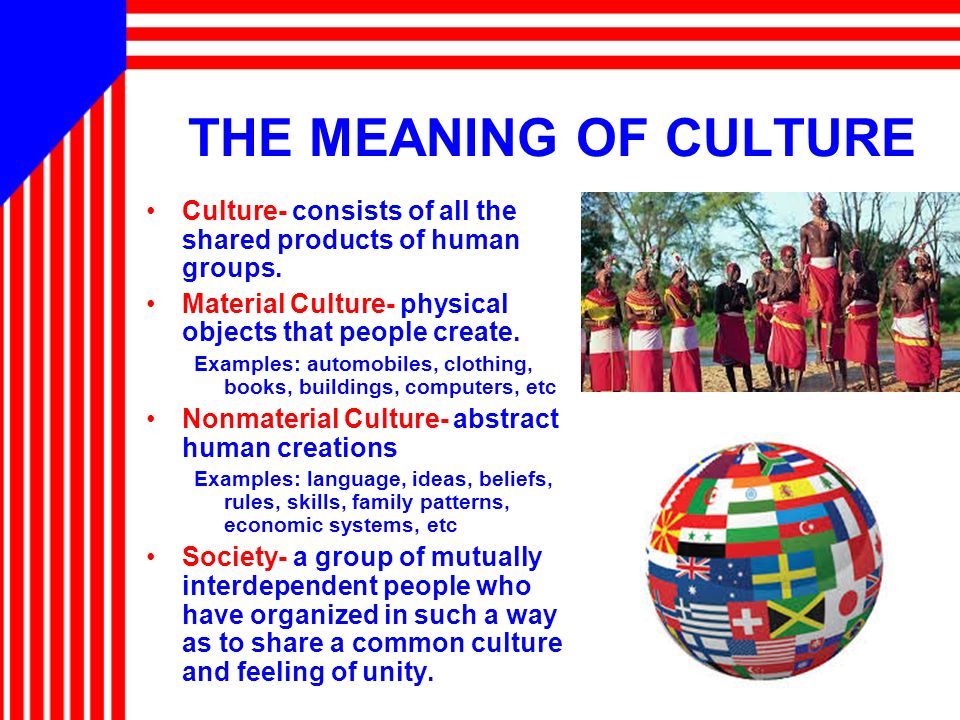
Evaluation:
1. What is culture?
2. List two components of culture.
ASSIGNMENT:Read Solakat new syllabus on social studies for junior secondary schools.page 47.by A.Oluwasola Oyewole
TOPIC: CULTURE
CONTENT: Features of Culture
Features of Culture:
Some ways of looking at culture include:
1. Language: This is one of the most important ways of identifying a group of people. It is a means of transmitting our culture from one generation to another. There are over 250 indigenous languages in Nigeria. Proverbs are an important aspect of speech in Nigeria.
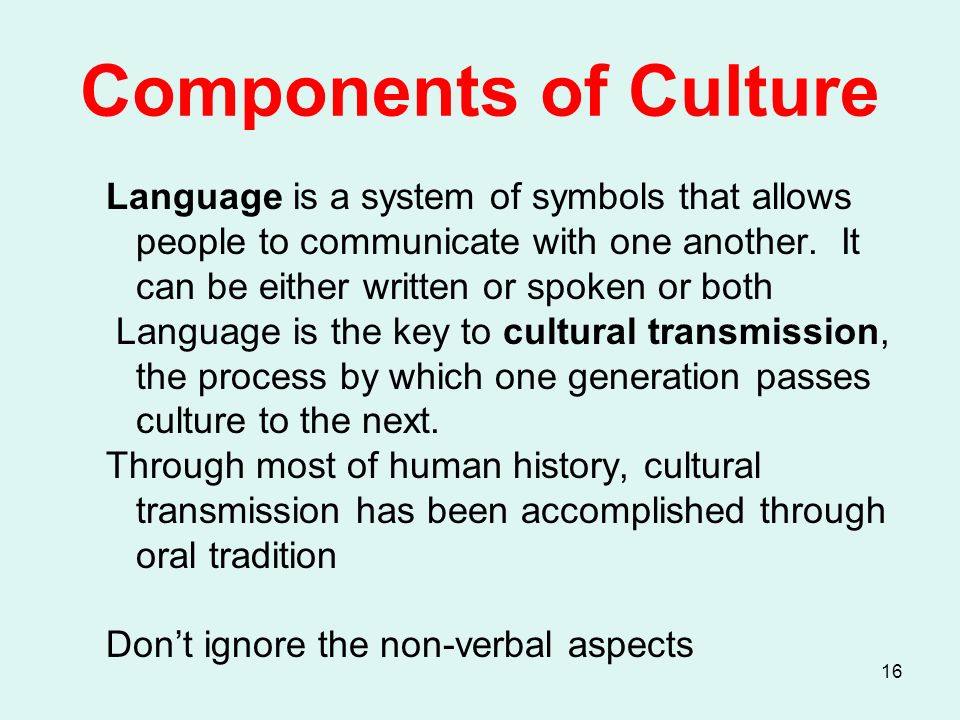
2. Religion: This is an important aspect of culture. Each cultural group has its own traditional way of relating with the supernatural before the advent of Christianity and Islam.

3. Mode of Dressing: The way a group of people dress is another feature of culture. For example, Hausa-Fulanis wrap their heads with a piece of cloth; wear ‘danshiki’ while their women often wear clothes that cover all parts of their bodies.

4. Legends: the belief and story of each ethnic group about the origin of man and the world is another feature of culture.

5. Folklores: These are stories about man and animals such as tortoise and elephant. It serves as a means of entertainment and a form of moral education.

6. Arts and crafts: Each cultural group has its unique art and craft in form of carvings, metal works, painting, sculptures, wood work, etc. arts and Crafts are products of our physical environment.

7. Games and Entertainment: Each cultural group has its own game such as ‘Ayo and Okoto’ in Yorubaland. Entertainment is in form of singing. The Yorubas play musical instrument such as ‘gangan’, ‘bata’ and ‘dundun’ while ‘shantu’ and ‘samban’ sets of drums are popular among the Hausa-Fulanis.

8. Food and Drinks: In the Nigeria traditional societies, only solid food is recognized as real food while liquid is regarded as mere refreshment. Palm wine is popular among the Yorubas and the Igbos. ‘Burukutu’ and ‘sekete’ are popular in Hausaland. Pounded yam and yam flour are common solid food in Yorubaland while ‘Tuwo’ and ‘Danwake’ are popular among Hausa-Fulanis.

9. Skills and Tools (Technology): Before the arrival of the Europeans in Nigeria, there were small industries made up of small workshops. Making of ivory and brass wares were the preoccupation of the Binis. The Ijaws and the Itsekiris were noted for salt-making while the Akoko-Edos and the Iseyins produced clothes, etc.

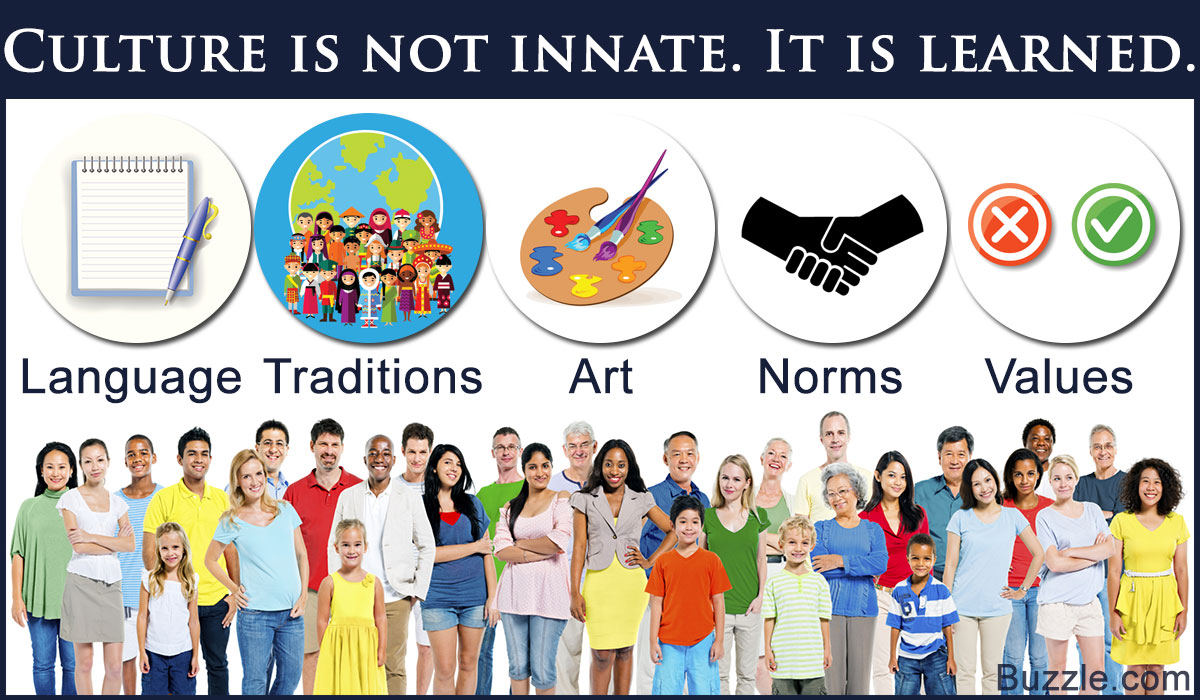
Evaluation:
1. List five features of culture.
2. Explain the listed features of culture.
Reading Assignment: Read Solakat Social Studies for Junior Secondary Schools, Basic 7 by oyewole, A. O. Theme 4, Chapter 8, Unit 8.4, page 48-50
Assignment:
Objective questions:
1. There are over _________ indigenous languages in Nigeria (a) 100 ( b). 250 (c) 500 (d)200
2. ‘Tuwo’ and ‘Danwake’ are popular among __________(a) Hausa-Fulanis( b). Yorubas (c). Igbos (d)Edo
3. The ________ play musical instrument such as ‘gangan’, ‘bata’ and ‘dundun’ ( a). Igbos (b). Hausas (c). Yorubas .(d)Benin
4. Stories about man and animals such as tortoise and elephant are called (a). folklores (b). fictions (c). factions (d) culture
5. The following are features of culture except (a). rigidity (b). language ( c). religion (d) administration
Theory questions:
1. State five features of culture.
2. Write short notes on any two of the stated features.
CONTENT:1. Meaning of culture
2. Components of culture-material and non-material culture
Meaning of culture
Culture is the total way of life of a group of people that distinguishes them from others. It includes people’s beliefs, their works of art and craft, the language they speak, the tools they make, their ways of dressing, the technology they develop and the various institutions they set up to achieve societal goals.
Culture is not static, but dynamic. In other words, it does not remain the same forever but changes from time to time. It is a continuous process. It is transmitted from one generation to another. People learn their culture as they perform new roles as pupils or students in a school, a father at home or as a president of a country.

Components of Culture:
There are two components or aspects of culture. They are:
1. Material Aspect of Culture: This consists mainly of those things that are made by a society in order to satisfy the needs of its people. Examples are houses for shelter and protection; the tools for agriculture; the weapons for hunting and protection; the cloth and clothes made to suit the conditions of the environment; and the work of art and craft.
2. Non-Material Aspect of Culture: This aspect of culture consists of those things we cannot see like religion, music, language, morals, values, folklores, literature, dancing styles, technology, etc.

Evaluation:
1. What is culture?
2. List two components of culture.
ASSIGNMENT:Read Solakat new syllabus on social studies for junior secondary schools.page 47.by A.Oluwasola Oyewole
TOPIC: CULTURE
CONTENT: Features of Culture
Features of Culture:
Some ways of looking at culture include:
1. Language: This is one of the most important ways of identifying a group of people. It is a means of transmitting our culture from one generation to another. There are over 250 indigenous languages in Nigeria. Proverbs are an important aspect of speech in Nigeria.

2. Religion: This is an important aspect of culture. Each cultural group has its own traditional way of relating with the supernatural before the advent of Christianity and Islam.

3. Mode of Dressing: The way a group of people dress is another feature of culture. For example, Hausa-Fulanis wrap their heads with a piece of cloth; wear ‘danshiki’ while their women often wear clothes that cover all parts of their bodies.

4. Legends: the belief and story of each ethnic group about the origin of man and the world is another feature of culture.

5. Folklores: These are stories about man and animals such as tortoise and elephant. It serves as a means of entertainment and a form of moral education.

6. Arts and crafts: Each cultural group has its unique art and craft in form of carvings, metal works, painting, sculptures, wood work, etc. arts and Crafts are products of our physical environment.

7. Games and Entertainment: Each cultural group has its own game such as ‘Ayo and Okoto’ in Yorubaland. Entertainment is in form of singing. The Yorubas play musical instrument such as ‘gangan’, ‘bata’ and ‘dundun’ while ‘shantu’ and ‘samban’ sets of drums are popular among the Hausa-Fulanis.

8. Food and Drinks: In the Nigeria traditional societies, only solid food is recognized as real food while liquid is regarded as mere refreshment. Palm wine is popular among the Yorubas and the Igbos. ‘Burukutu’ and ‘sekete’ are popular in Hausaland. Pounded yam and yam flour are common solid food in Yorubaland while ‘Tuwo’ and ‘Danwake’ are popular among Hausa-Fulanis.

9. Skills and Tools (Technology): Before the arrival of the Europeans in Nigeria, there were small industries made up of small workshops. Making of ivory and brass wares were the preoccupation of the Binis. The Ijaws and the Itsekiris were noted for salt-making while the Akoko-Edos and the Iseyins produced clothes, etc.


Evaluation:
1. List five features of culture.
2. Explain the listed features of culture.
Reading Assignment: Read Solakat Social Studies for Junior Secondary Schools, Basic 7 by oyewole, A. O. Theme 4, Chapter 8, Unit 8.4, page 48-50
Assignment:
Objective questions:
1. There are over _________ indigenous languages in Nigeria (a) 100 ( b). 250 (c) 500 (d)200
2. ‘Tuwo’ and ‘Danwake’ are popular among __________(a) Hausa-Fulanis( b). Yorubas (c). Igbos (d)Edo
3. The ________ play musical instrument such as ‘gangan’, ‘bata’ and ‘dundun’ ( a). Igbos (b). Hausas (c). Yorubas .(d)Benin
4. Stories about man and animals such as tortoise and elephant are called (a). folklores (b). fictions (c). factions (d) culture
5. The following are features of culture except (a). rigidity (b). language ( c). religion (d) administration
Theory questions:
1. State five features of culture.
2. Write short notes on any two of the stated features.
WEEK 5
SPECIFIC TOPIC: CULTURAL SIMILARITIES.
REFERENCE BOOKS: Social Studies for Nigerian JSS Book 1, by Remi E. Aiyede Et al. Basic Social Studies For Nigeria Secondary Schools by Anikpo et al. Simplified Social Studies for JSS by Ogunwale A.
PERFORMANCE OBJECTIVES: At the end of the lesson, the students should be able to:
1. list the cultural similarities we have in Nigeria
CONTENTS:
CULTURAL SIMILARITIES.
There Are more than 300 tribes in Nigeria and these major groups have their own languages and cultures.
Despite the different cultures in Nigeria there are still similarities between these groups. Some of these similarities are as follow:
1. Respect for elders and rulers. This is common in all ethnic groups in Nigeria.
2. All societies in Nigeria have their peculiar style of arts and crafts.
3. The use of cutlasses, hoes, sickles and other farming implements for farming are common among these tribes.
4. Selection of elderly people as leaders on the basis of their wisdom and age is common and not how rich a person may be.
5. In marriage ceremonies in Nigeria, the groom pays the bride price and also polyandry is not practiced in Nigeria so also is gay and lesbian marriage.
6. The existence of age grade system for decision making, community development and defence of the society is common.
EVALUATION/ CLASSWORK:
List and explain the cultural similarities existing between different tribes in Nigeria.
ASSIGNMENT:
List five festivals that are common in your area that the people in the area participate fully in.
further studies
http://www.cometonigeria.com/about-nige ... e-culture/
http://www.nigeriaembassyusa.org/index. ... re-tourism
LESSON 32
SPECIFIC TOPIC: CULTURAL DIFFERENCES.
REFERENCE BOOK S: Social Studies for Nigerian JSS Book 1, by Remi E. Aiyede Et al. Basic Social Studies for Nigeria Secondary Schools by Anikpo et al. Simplified Social Studies for JSS by Ogunwale A.
PERFORMANCE OBJECTIVES: At the end of the lesson, the students should be able to:
1. explain the meaning of cultural differences.
2. list the cultural differences we have in Nigeria.
CONTENTS:
CULTURAL DIFFERENCES IN NIGERIA.
The natural environment of Nigeria is one of the major factors which produce cultural differentiation. This can also be observed in the following areas:
1. Arts and crafts- people in the forest engage in wood carving, leather work in the savanna region and raffia in the south-south.
2. Religion: There are different religions in different areas; these are Christianity, Islam and African traditional religion.
3. Languages: There are different languages in Nigeria, and this is closely related to their myths, legends and superstitions
4. Occupations and products: The natural environment in different parts of Nigeria dictates the different types of occupation and products, e.g. tree crops are found in the south while the grassland of the Northern parts of Nigeria are associated with grains such as guinea corn and millet.
5. Greetings: The ways people greet in different parts of Nigeria is different from one place to another according to culture of the group or ethnic grouping e.g. Yoruba, Igbo Hausa Ijaw e.t.c.
6. Dressing: According to the tribes we have in Nigeria so are the dressing types. E.g. Hausa's dressing is different from that of Igbo, so is that of Yoruba from that of Tiv or Kalabri.
7. Housing: the pattern of housing in Nigeria differs from one geo-political zone to another, until recently when modernization has changed the face of things to some extent.
EVALUATION/ CLASSWORK:
1. Explain what is meant by 'cultural differences'
2. List some of the cultural differences in Nigeria that you have learnt.
HOME WORK/ ASSIGNMENT:
List 15 ethnic groups in Nigeria and where they are found.
further studies
http://naijalit.wordpress.com/2012/01/2 ... -and-igbo/
REFERENCE BOOKS: Social Studies for Nigerian JSS Book 1, by Remi E. Aiyede Et al. Basic Social Studies For Nigeria Secondary Schools by Anikpo et al. Simplified Social Studies for JSS by Ogunwale A.
PERFORMANCE OBJECTIVES: At the end of the lesson, the students should be able to:
1. list the cultural similarities we have in Nigeria
CONTENTS:
CULTURAL SIMILARITIES.
There Are more than 300 tribes in Nigeria and these major groups have their own languages and cultures.
Despite the different cultures in Nigeria there are still similarities between these groups. Some of these similarities are as follow:
1. Respect for elders and rulers. This is common in all ethnic groups in Nigeria.
2. All societies in Nigeria have their peculiar style of arts and crafts.
3. The use of cutlasses, hoes, sickles and other farming implements for farming are common among these tribes.
4. Selection of elderly people as leaders on the basis of their wisdom and age is common and not how rich a person may be.
5. In marriage ceremonies in Nigeria, the groom pays the bride price and also polyandry is not practiced in Nigeria so also is gay and lesbian marriage.
6. The existence of age grade system for decision making, community development and defence of the society is common.
EVALUATION/ CLASSWORK:
List and explain the cultural similarities existing between different tribes in Nigeria.
ASSIGNMENT:
List five festivals that are common in your area that the people in the area participate fully in.
further studies
http://www.cometonigeria.com/about-nige ... e-culture/
http://www.nigeriaembassyusa.org/index. ... re-tourism
LESSON 32
SPECIFIC TOPIC: CULTURAL DIFFERENCES.
REFERENCE BOOK S: Social Studies for Nigerian JSS Book 1, by Remi E. Aiyede Et al. Basic Social Studies for Nigeria Secondary Schools by Anikpo et al. Simplified Social Studies for JSS by Ogunwale A.
PERFORMANCE OBJECTIVES: At the end of the lesson, the students should be able to:
1. explain the meaning of cultural differences.
2. list the cultural differences we have in Nigeria.
CONTENTS:
CULTURAL DIFFERENCES IN NIGERIA.
The natural environment of Nigeria is one of the major factors which produce cultural differentiation. This can also be observed in the following areas:
1. Arts and crafts- people in the forest engage in wood carving, leather work in the savanna region and raffia in the south-south.
2. Religion: There are different religions in different areas; these are Christianity, Islam and African traditional religion.
3. Languages: There are different languages in Nigeria, and this is closely related to their myths, legends and superstitions
4. Occupations and products: The natural environment in different parts of Nigeria dictates the different types of occupation and products, e.g. tree crops are found in the south while the grassland of the Northern parts of Nigeria are associated with grains such as guinea corn and millet.
5. Greetings: The ways people greet in different parts of Nigeria is different from one place to another according to culture of the group or ethnic grouping e.g. Yoruba, Igbo Hausa Ijaw e.t.c.
6. Dressing: According to the tribes we have in Nigeria so are the dressing types. E.g. Hausa's dressing is different from that of Igbo, so is that of Yoruba from that of Tiv or Kalabri.
7. Housing: the pattern of housing in Nigeria differs from one geo-political zone to another, until recently when modernization has changed the face of things to some extent.
EVALUATION/ CLASSWORK:
1. Explain what is meant by 'cultural differences'
2. List some of the cultural differences in Nigeria that you have learnt.
HOME WORK/ ASSIGNMENT:
List 15 ethnic groups in Nigeria and where they are found.
further studies
http://naijalit.wordpress.com/2012/01/2 ... -and-igbo/
WEEK 6
MAIN TOPIC: CULTURE AND IDENTITY.
SPECIFIC TOPIC: CULTURAL INTEGRATION.
REFERENCE BOOKS: Social Studies for Nigerian JSS Book 1, by Remi E. Aiyede Et al. Basic Social Studies for Nigeria Secondary Schools by Anikpo et al. Simplified Social Studies for JSS by Ogunwale A.
PERFORMANCE OBJECTIVES: At the end of the lesson, the students should be able to:
1. explain how environment affects culture.
2. discuss how climate will affect culture.
CONTENTS:
CULTURE AND ENVIRONMENT.
The environment affects greatly the culture of people or group e.g. in riverine region the people engage in fishing and in swimming/regatta. In Savannah region, animal rearing is common because of presence of grasses.
In the forest zone, the people there engage in wood carving, hunting and lumbering due to presence of trees in the area.
The type of houses built in an area will also depend on the environment, e.g. stilt house are built in riverine areas, thatched roof houses in the savannah regions of Nigeria.
CULTURE AND CHANGE.
Our culture is passed on to us by our parents and by people in our group who are older than us. Each generation can change, or add to their culture e.g. in the olden days our fore fathers were educated at home by their family members, they made long journey on foot, but today, education is in schools and transportation system in various ways.i.e. Modern methods.
EVALUATION/ CLASSWORK:
1. Explain how environment will affect culture in an area.
2. Explain two ways by which changes have taken place in our modern culture.
further studies
http://teachmiddleeast.lib.uchicago.edu ... ue-01.html
https://www.boundless.com/psychology/na ... -identity/
http://education.nationalgeographic.com ... te/?ar_a=1
http://www.educationscotland.gov.uk/wea ... ffects.asp
http://www.coe.int/t/dg4/cultureheritag ... 809_en.asp
LESSON 34
MAIN TOPIC: CULTURE AND IDENTITY
SPECIFIC TOPIC: CULTURAL INTEGRATION. REFERENCE BOOKS: Social Studies for Nigerian JSS Book 1, by Remi E. Aiyede Et al. Basic Social Studies For Nigeria Secondary Schools by Anikpo et al. Simplified Social Studies for JSS by Ogunwale A.
PERFORMANCE OBJECTIVES: At the end of the lesson, the students should be able to:
1. explain what is meant by cultural integration.
2. list the types of integration in an area.
CONTENTS:
CULTURAL INTEGRATION.
This refers to coming together of various sets of people of different culture to share a common way of life. It allows them to speak the same language, dress the same way, build their houses in similar styles and share beliefs about tradition.
It is also a process by which different units or parts make a whole.
TYPES OF INTEGRATION.
1. SOCIAL INTEGRATION- This is a process of cementing the different social groups together and concretizing unity in diversity.
2. NATIONAL INTEGRATION- This is the process of binging together culturally and socially different groups into a single territorial unit or nation.
3. ECONOMIC INTEGRATION- This is a process/system by which different communities come together for economic co operations.
EVALUATION/ CLASSWORK:
1. what is cultural integration?
2. Explain the types of integration you have been taught.
ASSIGNMENT:
List five Economic co operations in the world.
further studies
http://www.punchng.com/news/soyinka-adv ... tegration/
http://www.theheraldnews.info/achieving ... ntegration
MAIN TOPIC: CULTURE AND IDENTITY.
SPECIFIC TOPIC: IMPORTANCE OF CULTURAL INTEGRATION.
REFERENCE BOOK S: Social Studies for Nigerian JSS Book 1, by Remi E. Aiyede Et al. Basic Social Studies for Nigeria Secondary Schools by Anikpo et al. Simplified Social Studies for JSS by Ogunwale A.
PERFORMANCE OBJECTIVES: At the end of the lesson, the students should be able to:
1. discuss the importance of cultural integration
2. list efforts of Nigerian government towards national integration.
CONTENTS:
IMPORTANCE OF CULTURAL INTEGRATION.
1. It promotes peaceful co-existence among the people.
2. It reduces conflicts among the people.
3. It promotes political development.
4. It gives Nigerians sense of oneness.
5. It makes people work together to achieve common goal.
6. It creates condition for progress.
7. It will lay good foundation for economic and social development.
8. It will promote internal movement that will enable Nigerians to live and work anywhere in the country.

Nigerian government has taken some bold steps towards national integration in the following ways:
1. Adoption of Federal Character.
2. The introduction of quota system.
3. Establishment of Unity Schools.
4. Creation of more states in the Federation.
5 The establishment of N.Y.S.C. Scheme.
6. The establishment of National Orientation Agency.
EVALUATION/ CLASSWORK:
1. Explain the importance of cultural integration to Nigerians.
2. List four efforts made by Nigerian government to integrate the nation.
practice test
http://anthro.palomar.edu/culture/quizzes/Culquiz1.htm
http://www.jagranjosh.com/articles/worl ... 14681777-1
http://www.quizfactor.com/quiz/world-cu ... answerid=0
LESSON 36
MAIN TOPIC:. MARRIAGE.
SPECIFIC TOPIC: MEANING, TYPES AND FUNCTIONS OF MARRIAGE.
REFERENCE BOOKS: Social Studies for Nigerian JSS Book 1, by Remi E. Aiyede Et al. Basic Social Studies for Nigeria Secondary Schools by Anikpo et al. Simplified Social Studies for JSS by Ogunwale A.
PERFORMANCE OBJECTIVES: At the end of the lesson, the students should be able to:
1. define marriage.
2. list types of marriage.
CONTENTS:
WHAT IS MARRIAGE?
Marriage is part of institution, and an institution through which two people come together as one. Marriage is the beginning of a family life. It is also joining together of a man and a woman legally as husband and wife.
If a man marries from his tribe it is known as intra-tribal or intra-ethnic marriage.
If a man marries from either tribe it is known as inter-tribal or inter-ethnic marriage.
A man that marries only one wife, the type of marriage is known as monogamy.
A man who married more than one wife is referred to as polygamous
TYPES OF MARRIAGE.
There are three types of marriages, and these are;
1. CUSTOMARY OR TRADITIONAL MARRIAGE: This type of marriage is performed according to the customs and tradition of a particular group of people. Some of the items used for the marriage are kola nut, goat, yam, money and other traditional items.
This marriage is anchored by the elders, Under this type of marriage a man is allowed to marry more than one wife,

2. RELIGIOUS MARRIAGE. There are two forms of religious marriage and these are:
a. Christian or Church marriage. This takes place in the church and it only allows for one man one wife I.e. monogamous marriage.

b. Islamic marriage. This takes place in the mosque or the house of the bride>s parent. It is also known as AL-NIKAH. A man can marry more than one wife.

3. ORDINANCE OR COURT MARRIAGE: This takes place in the court or a marriage registry. The couple will sign the marriage register in the court. A man cannot marry more than one wife.

EVALUATION/ CLASSWORK:
1. Define the term 'marriage'.
2. List and explain the types of marriage you have been taught.
further studies
http://www.onlinenigeria.com/marriages- ... -Marriage/
http://en.wikipedia.org/wiki/Types_of_marriages
SPECIFIC TOPIC: CULTURAL INTEGRATION.
REFERENCE BOOKS: Social Studies for Nigerian JSS Book 1, by Remi E. Aiyede Et al. Basic Social Studies for Nigeria Secondary Schools by Anikpo et al. Simplified Social Studies for JSS by Ogunwale A.
PERFORMANCE OBJECTIVES: At the end of the lesson, the students should be able to:
1. explain how environment affects culture.
2. discuss how climate will affect culture.
CONTENTS:
CULTURE AND ENVIRONMENT.
The environment affects greatly the culture of people or group e.g. in riverine region the people engage in fishing and in swimming/regatta. In Savannah region, animal rearing is common because of presence of grasses.
In the forest zone, the people there engage in wood carving, hunting and lumbering due to presence of trees in the area.
The type of houses built in an area will also depend on the environment, e.g. stilt house are built in riverine areas, thatched roof houses in the savannah regions of Nigeria.
CULTURE AND CHANGE.
Our culture is passed on to us by our parents and by people in our group who are older than us. Each generation can change, or add to their culture e.g. in the olden days our fore fathers were educated at home by their family members, they made long journey on foot, but today, education is in schools and transportation system in various ways.i.e. Modern methods.
EVALUATION/ CLASSWORK:
1. Explain how environment will affect culture in an area.
2. Explain two ways by which changes have taken place in our modern culture.
further studies
http://teachmiddleeast.lib.uchicago.edu ... ue-01.html
https://www.boundless.com/psychology/na ... -identity/
http://education.nationalgeographic.com ... te/?ar_a=1
http://www.educationscotland.gov.uk/wea ... ffects.asp
http://www.coe.int/t/dg4/cultureheritag ... 809_en.asp
LESSON 34
MAIN TOPIC: CULTURE AND IDENTITY
SPECIFIC TOPIC: CULTURAL INTEGRATION. REFERENCE BOOKS: Social Studies for Nigerian JSS Book 1, by Remi E. Aiyede Et al. Basic Social Studies For Nigeria Secondary Schools by Anikpo et al. Simplified Social Studies for JSS by Ogunwale A.
PERFORMANCE OBJECTIVES: At the end of the lesson, the students should be able to:
1. explain what is meant by cultural integration.
2. list the types of integration in an area.
CONTENTS:
CULTURAL INTEGRATION.
This refers to coming together of various sets of people of different culture to share a common way of life. It allows them to speak the same language, dress the same way, build their houses in similar styles and share beliefs about tradition.
It is also a process by which different units or parts make a whole.
TYPES OF INTEGRATION.
1. SOCIAL INTEGRATION- This is a process of cementing the different social groups together and concretizing unity in diversity.
2. NATIONAL INTEGRATION- This is the process of binging together culturally and socially different groups into a single territorial unit or nation.
3. ECONOMIC INTEGRATION- This is a process/system by which different communities come together for economic co operations.
EVALUATION/ CLASSWORK:
1. what is cultural integration?
2. Explain the types of integration you have been taught.
ASSIGNMENT:
List five Economic co operations in the world.
further studies
http://www.punchng.com/news/soyinka-adv ... tegration/
http://www.theheraldnews.info/achieving ... ntegration
MAIN TOPIC: CULTURE AND IDENTITY.
SPECIFIC TOPIC: IMPORTANCE OF CULTURAL INTEGRATION.
REFERENCE BOOK S: Social Studies for Nigerian JSS Book 1, by Remi E. Aiyede Et al. Basic Social Studies for Nigeria Secondary Schools by Anikpo et al. Simplified Social Studies for JSS by Ogunwale A.
PERFORMANCE OBJECTIVES: At the end of the lesson, the students should be able to:
1. discuss the importance of cultural integration
2. list efforts of Nigerian government towards national integration.
CONTENTS:
IMPORTANCE OF CULTURAL INTEGRATION.
1. It promotes peaceful co-existence among the people.
2. It reduces conflicts among the people.
3. It promotes political development.
4. It gives Nigerians sense of oneness.
5. It makes people work together to achieve common goal.
6. It creates condition for progress.
7. It will lay good foundation for economic and social development.
8. It will promote internal movement that will enable Nigerians to live and work anywhere in the country.
Nigerian government has taken some bold steps towards national integration in the following ways:
1. Adoption of Federal Character.
2. The introduction of quota system.
3. Establishment of Unity Schools.
4. Creation of more states in the Federation.
5 The establishment of N.Y.S.C. Scheme.
6. The establishment of National Orientation Agency.
EVALUATION/ CLASSWORK:
1. Explain the importance of cultural integration to Nigerians.
2. List four efforts made by Nigerian government to integrate the nation.
practice test
http://anthro.palomar.edu/culture/quizzes/Culquiz1.htm
http://www.jagranjosh.com/articles/worl ... 14681777-1
http://www.quizfactor.com/quiz/world-cu ... answerid=0
LESSON 36
MAIN TOPIC:. MARRIAGE.
SPECIFIC TOPIC: MEANING, TYPES AND FUNCTIONS OF MARRIAGE.
REFERENCE BOOKS: Social Studies for Nigerian JSS Book 1, by Remi E. Aiyede Et al. Basic Social Studies for Nigeria Secondary Schools by Anikpo et al. Simplified Social Studies for JSS by Ogunwale A.
PERFORMANCE OBJECTIVES: At the end of the lesson, the students should be able to:
1. define marriage.
2. list types of marriage.
CONTENTS:
WHAT IS MARRIAGE?
Marriage is part of institution, and an institution through which two people come together as one. Marriage is the beginning of a family life. It is also joining together of a man and a woman legally as husband and wife.
If a man marries from his tribe it is known as intra-tribal or intra-ethnic marriage.
If a man marries from either tribe it is known as inter-tribal or inter-ethnic marriage.
A man that marries only one wife, the type of marriage is known as monogamy.
A man who married more than one wife is referred to as polygamous
TYPES OF MARRIAGE.
There are three types of marriages, and these are;
1. CUSTOMARY OR TRADITIONAL MARRIAGE: This type of marriage is performed according to the customs and tradition of a particular group of people. Some of the items used for the marriage are kola nut, goat, yam, money and other traditional items.
This marriage is anchored by the elders, Under this type of marriage a man is allowed to marry more than one wife,
2. RELIGIOUS MARRIAGE. There are two forms of religious marriage and these are:
a. Christian or Church marriage. This takes place in the church and it only allows for one man one wife I.e. monogamous marriage.
b. Islamic marriage. This takes place in the mosque or the house of the bride>s parent. It is also known as AL-NIKAH. A man can marry more than one wife.
3. ORDINANCE OR COURT MARRIAGE: This takes place in the court or a marriage registry. The couple will sign the marriage register in the court. A man cannot marry more than one wife.
EVALUATION/ CLASSWORK:
1. Define the term 'marriage'.
2. List and explain the types of marriage you have been taught.
further studies
http://www.onlinenigeria.com/marriages- ... -Marriage/
http://en.wikipedia.org/wiki/Types_of_marriages
WEEK 7
TOPIC: Culture:(a)characteristics of culture(b)cultural similarities in Nigeria (c)cultural differences in Nigeria
Contents 1. Characteristics of Culture
2.Cultural similarities in Nigeria
3.Cultural differences in Nigeria
Sub-topic 1.
CHARACTERISTICS OF CULTURE
The following are some of the characteristics of culture:
1. Culture defines a group of people. It defers from place to place.
2. Culture is dynamic, flexible and changes with time as technology changes and as people come in contact with other cultures.
3. It is a collective experience of a community or a group of people. It is not restricted to a person.
4. It is a continuous process that is passed from one generation to another. There can be no people without culture. It is an enduring characteristic of human society.
5. An individual learns the culture of his society through the agents of socialization such as family, the school, peer group, the community, mass media, etc.
6. No culture is bad or inferior. Each group has its own definite culture as a result of its environment. This is called cultural relativity.
7. Culture is neither inborn nor a biological feature. It is created by a community in order to ensure harmonious and progressive living of its members.
Evaluation:
Mention five characteristics of culture
Reading Assignment: Read Solakat Social Studies for Junior Secondary Schools by Oyewole, A. O. Theme 4, chapter 8, Units 8.1-8.3, pages 47 & 48.
Assignment:
Objective questions:
1. The total way of life of a group of people is ____________ (a)environment ( b). culture (c). socialization (d).environment
2. Culture of any group of people is _____ (a). dynamic (b). static (c). dead ( d).natural
3. There are three aspects of culture ( a). True ( b). False
4. The following is an example of material culture(a) morals (b). music (c). hoes ( d).energy
5. Culture defines a group of ________ (a). animals (b). people (c). religion ( d).christian
Theory questions:
1. What is culture?
2. Give 4 examples each of material and non-material aspects of culture.
Sub-topic 2.
Cultural Similarities Among Nigerians:
There are similarities in the cultural practices of the Nigeria people. The following are some of the similar cultural practices of the people of Nigeria.
1. Political System: Each community in Nigeria has a traditional political system under a paramount chief with different titles. These include the obas, obis, ezes, emirs, and the obongs.
2. Family System: Extended family is a common feature of all cultures in Nigeria.
3. Respect for elders: According respect to elders is a feature of all communities and cultures in Nigeria. Irrespective of one’s social status, elders are respected in Nigeria and their words of advice are considered important.
4. Marriage System: The system of marriage is similar in most of the communities in Nigeria. Virgin brides are highly honoured in Nigeria and her parents are praised and presented with gifts.
5. Religion: Religion is the specific system of belief or worship; and it is a way of life based on how people relate with their God. There are three main types of religion in Nigeria; these are Christianity, Islam and Traditional religions. Nigerian people are religious; nearly every Nigerian belongs to one religious group or another. Before the advent of Christianity and Islam, each community believed in the existence of the Supreme being and had a traditional way of relating with Him.
6. Taboos: All ethnic groups in Nigeria have one form of taboo or another against something. A taboo against something means a belief or custom that does not allow people to do, use or talk about a particular thing, especially in public.
7. Occupation: Farming and trading are common to all cultures. These form the basic occupation of the people before the arrival of colonial masters.
8. Cultural Relationship: All groups accept people at home, in the street, in the town as ‘brother’ or ‘sister’ or ‘father’, even if there is no blood relationship. Outside the state or country, whoever is from your state or country is regarded as ‘brother’ or ‘sister’ whenever you meet and discuss with other nationalities.
9. Naming Ceremony: All cultural groups, all religious practices allow new born babies to be named after a particular number of days of delivery as stipulated by the group. For examples, yorubas do naming ceremony after eight days of delivery.
10. Arts and Crafts: All cultural groups in Nigeria have their distinct work of art and craft in form of carvings, sculpture, weaving, etc. for examples, the people of Kano were known for their leather work, the people of Benin city were known for their brass-casting, the people of Abeokuta were known for their tie and dye called adire, etc.
11. Mode of Eating: Eating habit such as the use of one’s fingers to eat is common to all traditional communities in Nigeria.
12. Emphasis on Dignity of Labour: Nigerians place high value on dignity of labour, good neighbourliness and patriotism. No job is bad within the Nigerian culture. stealing is abhorred and disrespected.
Evaluation:
1. State five cultural similarities in Nigeria.
2. Explain the stated cultural similarities.
Reading Assignment: Read Solakat Social Studies for Junior Secondary Schools, Basic 7 by oyewole, A. O. Theme 4, Chapter 8, Unit 8.5, pages 50-52.
Assignment:
Objective questions:
1. A belief or custom that does not allow people to do, use or talk about a particular thing, especially in public is a ______ (a). lie (b). taboo ( c). fiction (d) storis
2. In the olden days Nigerians used _________ to eat food( a). fingers (b). spoons (c). forks (d) knife.
3. Adire making is popular among the ____ ( a). Hausas ( b). Igbos (c). Yorubas (d) benin.
4. Extended family is a common feature of all cultures in ________ (a). Nigeria ( b). Australia ( c). Germany (d) Togo
5. The following cultural practices are common to all Nigerians except ________ ( a). extended family system (b). mode of greetings (c). religion (d) none of the above.
Theory questions:
Write brief notes on any two of the following cultural similarities in Nigeria:
1. Religion
2. Respect for elders
3. Arts and Craft
4. Mariage system
Sub-topic 3: 1. Cultural Differences in Nigeria.
2. Identity.
Sub-Topic 1: Cultural Differences in Nigeria
1. Language: This is of the most remarkable difference which distinguishes one culture from the other in Nigeria. We have over 250 indigenous languages in the country.
2. Religion: Apart from the two major religions : Christianity and Islam, there are various traditional religious beliefs in Nigeria.
3. Arts and Crafts: also differs. For instance, while those in the south engage in wood carving, the northerners engage in leather works.
4. Food: Those in the southern part of Nigeria eat food made mostly from tubers like fufu while the northerners eat food made from grains e.g tuwo.
5. Dressing: The Igbo man wears caftan and ties a wrapper while the woman ties wrapper with a blouse. The Hausa man on the other hand wears a babariga while the woman wear clothes that often cover the whole body.
6. Greetings: The various ethnic groups in Nigeria have their various patterns of greeting. The Yoruba man prostrates before the elders while the female ones kneel down. The Hausa male squats while the female kneel down.
Evaluation:
Mention five cultural differences among the different ethnic groups in Nigeria.
2: Identity
Identity is used to refer to those who share the same culture and regard themselves as one people. Culture is a means of identifying people.
Evaluation: What is identity?
Levels of Identity:
1. Family: Everyone shares his family’s identity through his surname. He identifies with his parents and siblings. The family teaches him the culture of the society in its own way.
2. Age group: A person identifies with his age-group. He tries to defend the interest of such group. Each age-group has its own norms and practices which members must obey. It may also have some means of communication which non-members may not understand. Age-group is very important in Igbo land and a man who fails to identify with his age-group may not be recognized.
3. Town/Village: A person identifies with his place of birth. He contributes to its progress both in cash and in kind. He belongs to one or more associations in his village or town.
4. Cultural or Ethnic group: Another level of identity is the cultural or ethnic group. Each Nigerian identifies himself as a Yoruba, Igbo, Kanuri or Bachama. Language, dressing and eating habits reveals the cultural background of a person.
5. Local Government: This is the smallest political unit in Nigeria. Every Nigerian belongs to a local government, the development of which he contributes to and from which he enjoys some services and social amenities.
6. State of Origin: A person identifies himself with his state of origin be it Cross River or Taraba State. He may like his state to win in an inter-state sport competition.
7. National Identity: All the 36 states form one country which is called the Federal Republic of Nigeria. We are one people under one Federal Government, enjoying the same services and obeying the same law. The Nigeria passport, the National Anthem, the National Pledge and the Nation Flag are all symbols of identity for Nigeria citizens both at home and abroad.
Evaluation:
Mention five levels of identity
Reading Assignment:
1. Social Studies for Junior Secondary Schools Book 1 By Abdullahi Ahmed and others. Pages 73 – 74.
2. Solakat New Syllabus on Social Studies for Junior Secondary Schools Basic Seven. By A. Oluwasola Oyewole Pages 50 – 52.
Assignment:
Objective questions:
1. All the following are Nigeria National Symbols EXCEPT
A. Currency B. National Anthem C. Language D. The Coat of Arm
2. What is used to refer to those who share the same culture and regard themselves as one people is known as ……………….
A. Culture. B. Identity. C. Symbol. D. Language.
3. The most remarkable difference which distinguishes one culture from the other in Nigeria is …………….
A. Language. B. Religion. C. Dressing. D. Greeting.
4. We have over ………. Indigenous languages in the country.
A. 150 B. 250 C. 350 D. 450
5. The most common food in the North is food made from ………….
A. Tuber B. Fufu C. Tuwo. D. Grains.
Contents 1. Characteristics of Culture
2.Cultural similarities in Nigeria
3.Cultural differences in Nigeria
Sub-topic 1.
CHARACTERISTICS OF CULTURE
The following are some of the characteristics of culture:
1. Culture defines a group of people. It defers from place to place.
2. Culture is dynamic, flexible and changes with time as technology changes and as people come in contact with other cultures.
3. It is a collective experience of a community or a group of people. It is not restricted to a person.
4. It is a continuous process that is passed from one generation to another. There can be no people without culture. It is an enduring characteristic of human society.
5. An individual learns the culture of his society through the agents of socialization such as family, the school, peer group, the community, mass media, etc.
6. No culture is bad or inferior. Each group has its own definite culture as a result of its environment. This is called cultural relativity.
7. Culture is neither inborn nor a biological feature. It is created by a community in order to ensure harmonious and progressive living of its members.
Evaluation:
Mention five characteristics of culture
Reading Assignment: Read Solakat Social Studies for Junior Secondary Schools by Oyewole, A. O. Theme 4, chapter 8, Units 8.1-8.3, pages 47 & 48.
Assignment:
Objective questions:
1. The total way of life of a group of people is ____________ (a)environment ( b). culture (c). socialization (d).environment
2. Culture of any group of people is _____ (a). dynamic (b). static (c). dead ( d).natural
3. There are three aspects of culture ( a). True ( b). False
4. The following is an example of material culture(a) morals (b). music (c). hoes ( d).energy
5. Culture defines a group of ________ (a). animals (b). people (c). religion ( d).christian
Theory questions:
1. What is culture?
2. Give 4 examples each of material and non-material aspects of culture.
Sub-topic 2.
Cultural Similarities Among Nigerians:
There are similarities in the cultural practices of the Nigeria people. The following are some of the similar cultural practices of the people of Nigeria.
1. Political System: Each community in Nigeria has a traditional political system under a paramount chief with different titles. These include the obas, obis, ezes, emirs, and the obongs.
2. Family System: Extended family is a common feature of all cultures in Nigeria.
3. Respect for elders: According respect to elders is a feature of all communities and cultures in Nigeria. Irrespective of one’s social status, elders are respected in Nigeria and their words of advice are considered important.
4. Marriage System: The system of marriage is similar in most of the communities in Nigeria. Virgin brides are highly honoured in Nigeria and her parents are praised and presented with gifts.
5. Religion: Religion is the specific system of belief or worship; and it is a way of life based on how people relate with their God. There are three main types of religion in Nigeria; these are Christianity, Islam and Traditional religions. Nigerian people are religious; nearly every Nigerian belongs to one religious group or another. Before the advent of Christianity and Islam, each community believed in the existence of the Supreme being and had a traditional way of relating with Him.
6. Taboos: All ethnic groups in Nigeria have one form of taboo or another against something. A taboo against something means a belief or custom that does not allow people to do, use or talk about a particular thing, especially in public.
7. Occupation: Farming and trading are common to all cultures. These form the basic occupation of the people before the arrival of colonial masters.
8. Cultural Relationship: All groups accept people at home, in the street, in the town as ‘brother’ or ‘sister’ or ‘father’, even if there is no blood relationship. Outside the state or country, whoever is from your state or country is regarded as ‘brother’ or ‘sister’ whenever you meet and discuss with other nationalities.
9. Naming Ceremony: All cultural groups, all religious practices allow new born babies to be named after a particular number of days of delivery as stipulated by the group. For examples, yorubas do naming ceremony after eight days of delivery.
10. Arts and Crafts: All cultural groups in Nigeria have their distinct work of art and craft in form of carvings, sculpture, weaving, etc. for examples, the people of Kano were known for their leather work, the people of Benin city were known for their brass-casting, the people of Abeokuta were known for their tie and dye called adire, etc.
11. Mode of Eating: Eating habit such as the use of one’s fingers to eat is common to all traditional communities in Nigeria.
12. Emphasis on Dignity of Labour: Nigerians place high value on dignity of labour, good neighbourliness and patriotism. No job is bad within the Nigerian culture. stealing is abhorred and disrespected.
Evaluation:
1. State five cultural similarities in Nigeria.
2. Explain the stated cultural similarities.
Reading Assignment: Read Solakat Social Studies for Junior Secondary Schools, Basic 7 by oyewole, A. O. Theme 4, Chapter 8, Unit 8.5, pages 50-52.
Assignment:
Objective questions:
1. A belief or custom that does not allow people to do, use or talk about a particular thing, especially in public is a ______ (a). lie (b). taboo ( c). fiction (d) storis
2. In the olden days Nigerians used _________ to eat food( a). fingers (b). spoons (c). forks (d) knife.
3. Adire making is popular among the ____ ( a). Hausas ( b). Igbos (c). Yorubas (d) benin.
4. Extended family is a common feature of all cultures in ________ (a). Nigeria ( b). Australia ( c). Germany (d) Togo
5. The following cultural practices are common to all Nigerians except ________ ( a). extended family system (b). mode of greetings (c). religion (d) none of the above.
Theory questions:
Write brief notes on any two of the following cultural similarities in Nigeria:
1. Religion
2. Respect for elders
3. Arts and Craft
4. Mariage system
Sub-topic 3: 1. Cultural Differences in Nigeria.
2. Identity.
Sub-Topic 1: Cultural Differences in Nigeria
1. Language: This is of the most remarkable difference which distinguishes one culture from the other in Nigeria. We have over 250 indigenous languages in the country.
2. Religion: Apart from the two major religions : Christianity and Islam, there are various traditional religious beliefs in Nigeria.
3. Arts and Crafts: also differs. For instance, while those in the south engage in wood carving, the northerners engage in leather works.
4. Food: Those in the southern part of Nigeria eat food made mostly from tubers like fufu while the northerners eat food made from grains e.g tuwo.
5. Dressing: The Igbo man wears caftan and ties a wrapper while the woman ties wrapper with a blouse. The Hausa man on the other hand wears a babariga while the woman wear clothes that often cover the whole body.
6. Greetings: The various ethnic groups in Nigeria have their various patterns of greeting. The Yoruba man prostrates before the elders while the female ones kneel down. The Hausa male squats while the female kneel down.
Evaluation:
Mention five cultural differences among the different ethnic groups in Nigeria.
2: Identity
Identity is used to refer to those who share the same culture and regard themselves as one people. Culture is a means of identifying people.
Evaluation: What is identity?
Levels of Identity:
1. Family: Everyone shares his family’s identity through his surname. He identifies with his parents and siblings. The family teaches him the culture of the society in its own way.
2. Age group: A person identifies with his age-group. He tries to defend the interest of such group. Each age-group has its own norms and practices which members must obey. It may also have some means of communication which non-members may not understand. Age-group is very important in Igbo land and a man who fails to identify with his age-group may not be recognized.
3. Town/Village: A person identifies with his place of birth. He contributes to its progress both in cash and in kind. He belongs to one or more associations in his village or town.
4. Cultural or Ethnic group: Another level of identity is the cultural or ethnic group. Each Nigerian identifies himself as a Yoruba, Igbo, Kanuri or Bachama. Language, dressing and eating habits reveals the cultural background of a person.
5. Local Government: This is the smallest political unit in Nigeria. Every Nigerian belongs to a local government, the development of which he contributes to and from which he enjoys some services and social amenities.
6. State of Origin: A person identifies himself with his state of origin be it Cross River or Taraba State. He may like his state to win in an inter-state sport competition.
7. National Identity: All the 36 states form one country which is called the Federal Republic of Nigeria. We are one people under one Federal Government, enjoying the same services and obeying the same law. The Nigeria passport, the National Anthem, the National Pledge and the Nation Flag are all symbols of identity for Nigeria citizens both at home and abroad.
Evaluation:
Mention five levels of identity
Reading Assignment:
1. Social Studies for Junior Secondary Schools Book 1 By Abdullahi Ahmed and others. Pages 73 – 74.
2. Solakat New Syllabus on Social Studies for Junior Secondary Schools Basic Seven. By A. Oluwasola Oyewole Pages 50 – 52.
Assignment:
Objective questions:
1. All the following are Nigeria National Symbols EXCEPT
A. Currency B. National Anthem C. Language D. The Coat of Arm
2. What is used to refer to those who share the same culture and regard themselves as one people is known as ……………….
A. Culture. B. Identity. C. Symbol. D. Language.
3. The most remarkable difference which distinguishes one culture from the other in Nigeria is …………….
A. Language. B. Religion. C. Dressing. D. Greeting.
4. We have over ………. Indigenous languages in the country.
A. 150 B. 250 C. 350 D. 450
5. The most common food in the North is food made from ………….
A. Tuber B. Fufu C. Tuwo. D. Grains.
WEEK 8
TOPIC: UNIQUNENESS OF NIGERIAN CULTURE
CONTENT: Meaning of Uniqueness
To be unique is to be special. Every aspect of Nigerian culture is unique in its operational mode.
Aspect of Uniqueness of Nigerian Culture:
1. History and ethnic relations
2. Unity in diversity
3. Marriage
4. Kinship Groups
5. Etiquette
6. Presentation of Kola-nut
7. Death and the after life
8. Dressing
1. History and Ethnic Relations
Every ethnic group in Nigerian has its own stories of where its ancestors came from. These vary from takes of people descending from the sky to stories of migration from far-off places. Archaeologist have found evidence of Neolithic humans who invited what is now Nigeria as far as far back as 12000 BC. This history makes the culture unique unlike other countries that belief that man came from Ape or Monkey.
2. Unity in Diversity
Nigerian is one nation but has so many nations in the nation. It is a country with many ethnic groups with different languages and their dialects. Each tribe in Nigeria no matter how small it may be has a particular language and dialect that it is known with.
3. Marriage
There are three types of marriages in Nigeria today. They are:
a. RELIGIOUS MARRIAGE
b. CIVIL MARRIAGE and
c. TRADITIONAL MARRIAGES
A Nigerian couple may decide to take part in one or all of these marriages. Religious marriages usually Christian or Muslim are conducted according to the norms of the respective religious teachings and take place in a church or mosque. Traditional marriages usually are held at the wife’s house and are performed according to the customs of the ethnic group involve. Many Nigerian ethnic groups follow the practice of offering a bride price for an intended wife; this makes marriage in Nigeria unique.
A bride price can take the form of money, cattle, or other valuable goods paid to the woman’s family.
4. Kinship Groups
While men dominate Igbo Society, women play an important role in kinship. All Igbo’s, men and women have close ties to their mothers’ clan, which usually lives in a different village. When an Igbo dies, the body is usually sent back to his mother’s village to be buried with his mother’s kin. If an Igbo is disgraced or cast out of his community, his mother’s kin will often take him in.
For the Hausa, however, there is not much of a sense of a wide ranging kinship. Hausa society is based on the nuclear family. There is a sense of larger extended family, including married siblings and their families, but there is little kinship beyond that. However the idea of blood being thicker than water is very strong in Hausa society. For this reason, many Hausa will try to stretch familial relationship to the broader idea of clan or tribe to the diffuse tension between or among neighbours.
5. Etiquette
Age is greatly respected in Nigeria. In an area where the average life expectancy is not very high, those who live into their senior years are seen as having earned special rights of respect and admiration. This is true of both men and women.
Socially, greetings are of the utmost importance. When one come in contact with an individual or visit a friend, it is considered rude not to engage in a proper greeting before getting down to business. Shaking hands, eating, or passing things with the left hand are unacceptable. The left hand is unaccepted. The left hand is reserved for personal toiletries and is considered dirty.
6. Presentation of Kola Nut
Presentation of kola nut is a unique aspect of Nigerian culture especially in Igbo land. The presentation of kola nut shows the acceptance of the visitor. Kola-nut has been described as a nut of unity because the Yoruba produce it, Hausa buy and sell and eat while the Igbo deeply respect it.
7. Death and After-life
Christians and Muslim Nigerians believe that there is judgment after death before going to heaven or hell. Many traditional religions, especially those of the eastern tribes believe in re-incarnation. In these tribes, people believe that the dead will come back as a member of his or her mother’s or sister’s family.
8. Dressing
Nigerian culture is unique in dressing pattern. Each tribe in Nigerian has a particular type of dressing they are known for. Each tribe in Nigeria is being recognized or identified by their native wear. Nigerian culture despite the type of dressing for different tribes sees it as a taboo for not covering delicate part of human body after dressing unlike other country culture where improper dressing is not seen as a crime.
Evaluation:
1. Define the word ‘unique’.
2. List five areas of uniqueness in Nigerian culture.
Assignment:
Objective question:
Select the correct answer to each question.
1. To be unique is --------------
a. Good b. Slow c. Special d. Outdated
2. Nigerian has only three dialects.
True or false.
3. We have _______ types of marriage in Nigeria
a. Five b. Three c. Four d. Six
4.Age is being ignored in Nigeria
True or False.
Theory questions:
1. Mention five aspect of uniqueness in Nigerian culture.
2. Explain three of those aspects.
CONTENT: Meaning of Uniqueness
To be unique is to be special. Every aspect of Nigerian culture is unique in its operational mode.
Aspect of Uniqueness of Nigerian Culture:
1. History and ethnic relations
2. Unity in diversity
3. Marriage
4. Kinship Groups
5. Etiquette
6. Presentation of Kola-nut
7. Death and the after life
8. Dressing
1. History and Ethnic Relations
Every ethnic group in Nigerian has its own stories of where its ancestors came from. These vary from takes of people descending from the sky to stories of migration from far-off places. Archaeologist have found evidence of Neolithic humans who invited what is now Nigeria as far as far back as 12000 BC. This history makes the culture unique unlike other countries that belief that man came from Ape or Monkey.
2. Unity in Diversity
Nigerian is one nation but has so many nations in the nation. It is a country with many ethnic groups with different languages and their dialects. Each tribe in Nigeria no matter how small it may be has a particular language and dialect that it is known with.
3. Marriage
There are three types of marriages in Nigeria today. They are:
a. RELIGIOUS MARRIAGE
b. CIVIL MARRIAGE and
c. TRADITIONAL MARRIAGES
A Nigerian couple may decide to take part in one or all of these marriages. Religious marriages usually Christian or Muslim are conducted according to the norms of the respective religious teachings and take place in a church or mosque. Traditional marriages usually are held at the wife’s house and are performed according to the customs of the ethnic group involve. Many Nigerian ethnic groups follow the practice of offering a bride price for an intended wife; this makes marriage in Nigeria unique.
A bride price can take the form of money, cattle, or other valuable goods paid to the woman’s family.
4. Kinship Groups
While men dominate Igbo Society, women play an important role in kinship. All Igbo’s, men and women have close ties to their mothers’ clan, which usually lives in a different village. When an Igbo dies, the body is usually sent back to his mother’s village to be buried with his mother’s kin. If an Igbo is disgraced or cast out of his community, his mother’s kin will often take him in.
For the Hausa, however, there is not much of a sense of a wide ranging kinship. Hausa society is based on the nuclear family. There is a sense of larger extended family, including married siblings and their families, but there is little kinship beyond that. However the idea of blood being thicker than water is very strong in Hausa society. For this reason, many Hausa will try to stretch familial relationship to the broader idea of clan or tribe to the diffuse tension between or among neighbours.
5. Etiquette
Age is greatly respected in Nigeria. In an area where the average life expectancy is not very high, those who live into their senior years are seen as having earned special rights of respect and admiration. This is true of both men and women.
Socially, greetings are of the utmost importance. When one come in contact with an individual or visit a friend, it is considered rude not to engage in a proper greeting before getting down to business. Shaking hands, eating, or passing things with the left hand are unacceptable. The left hand is unaccepted. The left hand is reserved for personal toiletries and is considered dirty.
6. Presentation of Kola Nut
Presentation of kola nut is a unique aspect of Nigerian culture especially in Igbo land. The presentation of kola nut shows the acceptance of the visitor. Kola-nut has been described as a nut of unity because the Yoruba produce it, Hausa buy and sell and eat while the Igbo deeply respect it.
7. Death and After-life
Christians and Muslim Nigerians believe that there is judgment after death before going to heaven or hell. Many traditional religions, especially those of the eastern tribes believe in re-incarnation. In these tribes, people believe that the dead will come back as a member of his or her mother’s or sister’s family.
8. Dressing
Nigerian culture is unique in dressing pattern. Each tribe in Nigerian has a particular type of dressing they are known for. Each tribe in Nigeria is being recognized or identified by their native wear. Nigerian culture despite the type of dressing for different tribes sees it as a taboo for not covering delicate part of human body after dressing unlike other country culture where improper dressing is not seen as a crime.
Evaluation:
1. Define the word ‘unique’.
2. List five areas of uniqueness in Nigerian culture.
Assignment:
Objective question:
Select the correct answer to each question.
1. To be unique is --------------
a. Good b. Slow c. Special d. Outdated
2. Nigerian has only three dialects.
True or false.
3. We have _______ types of marriage in Nigeria
a. Five b. Three c. Four d. Six
4.Age is being ignored in Nigeria
True or False.
Theory questions:
1. Mention five aspect of uniqueness in Nigerian culture.
2. Explain three of those aspects.
WEEK 9
MAIN TOPIC: MARRIAGE.
SPECIFIC TOPIC: FUNCTIONS OF MARRIAGE.
REFERENCE BOOKS: Social Studies for Nigerian JSS Book 1, by Remi E. Aiyede Et al. Basic Social Studies For Nigeria Secondary Schools by Anikpo et al. Simplified Social Studies for JSS by Ogunwale A.
PERFORMANCE OBJECTIVES: At the end of the lesson, the students should be able to:
1. explain the functions of marriage.
CONTENTS:
FUNCTIONS OF A FAMILY.
The following are the functions of marriage in the society
1. It enables a man and woman to love each other and share their love together.
2. It makes married couples to give birth to children.
3. It provides legal sexual satisfaction.
4. It helps to maintain unity and peace in the society.
5. People marry in order to help themselves.
6. People marry in other to justify some religious and customary obligations.
7. Through marriage, we can identify our lineage.
EVALUATION/ CLASSWORK:
List the functions of marriage as you understand it.
further studies
http://thepointernewsonline.com/?p=7878
http://www.angelfire.com/in/HisName/familypurpose.html
http://grasexuality.wordpress.com/2010/ ... -marriage/
http://apoxonbothyourhouses.blogspot.co ... riage.html
LESSON 38
MAIN TOPIC: MARRIAGE.
SPECIFIC TOPIC: CHALLENGES IN MARRIAGE.
REFERENCE BOOK S: Social Studies for Nigerian JSS Book 1, by Remi E. Aiyede Et al. Basic Social Studies for Nigeria Secondary Schools by Anikpo et al. Simplified Social Studies for JSS by Ogunwale A.
PERFORMANCE OBJECTIVES: At the end of the lesson, the students should be able to:
1. explain the challenges in marriage.
2. discuss the effects of marital problems.
CONTENTS:
CHALLENGES IN MARRIAGE.
There are some challenges or problems faced by married couples, these includes:
1. POVERTY: When the husband does not have enough money to take care of the wife and children.
2. SEPARATION: This is when the couple can no longer live together, or when one partner must be away for months at a time due to job demand.
3. DEATH: The death of husband or wife.
4. FAMILY INTERFERENCE: When parents or couples interfere with their internal arrangements.
5. UNFAITHFULNESS: This may be either from husband or wife which can lead to separation or divorce.
6. CHILDLESSNESS: If a wife does not bear children an husband may be prompted to marry another wife.
7. QUARRELING: This is when there is frequent misunderstanding between husband and wife.
8. DIFFERENCES IN RELIGION: When there is no mutual agreement between husband and wife on their religion before embarking in marriage.
9. ALCOHOLISM: When either of the couple is involved in excessive drinking and there is no agreement on how to stem it down.
10. DIVORCE: This is when a marriage is dissolved on inability to cope with their individual differences.
11. DRUG ABUSE / ADDICTION: When either of the couple is involved in wrong or dependent use of hard drugs, stimulant or other harmful substances and therefore become irresponsible in the discharge of his matrimonial duties.
EFFECTS OF MARITAL PROBLEMS.
1. It will make the children unhappy.
2. It will lead to inadequate contact with their parents.
3. Children are likely to engage in risky behaviour and keep bad company.
4. The children will be exposed to abuse e.g. drinking, prostitution and other vices.
5. The children will not be able to concentrate and perform well in their studies.
EVALUATION/ CLASSWORK:
1. Explain the challenges in marriage as you know.
2. List five effects of marriage problems as discussed earlier.
HOME WORK/ ASSIGNMENT:
1. What is marriage?
2. Explain some problems of traditional marriage in our society.
further studies
http://horosophy.com/uncategorized/marr ... ndle-them/
http://www.psychologytoday.com/blog/res ... escue-plan
http://pointblanknews.com/pbn/news/mari ... chiatrist/
practice test
http://www.gotoquiz.com/what_type_of_man_will_you_marry
http://www.proprofs.com/quiz-school/per ... &quesnum=1
SPECIFIC TOPIC: FUNCTIONS OF MARRIAGE.
REFERENCE BOOKS: Social Studies for Nigerian JSS Book 1, by Remi E. Aiyede Et al. Basic Social Studies For Nigeria Secondary Schools by Anikpo et al. Simplified Social Studies for JSS by Ogunwale A.
PERFORMANCE OBJECTIVES: At the end of the lesson, the students should be able to:
1. explain the functions of marriage.
CONTENTS:
FUNCTIONS OF A FAMILY.
The following are the functions of marriage in the society
1. It enables a man and woman to love each other and share their love together.
2. It makes married couples to give birth to children.
3. It provides legal sexual satisfaction.
4. It helps to maintain unity and peace in the society.
5. People marry in order to help themselves.
6. People marry in other to justify some religious and customary obligations.
7. Through marriage, we can identify our lineage.
EVALUATION/ CLASSWORK:
List the functions of marriage as you understand it.
further studies
http://thepointernewsonline.com/?p=7878
http://www.angelfire.com/in/HisName/familypurpose.html
http://grasexuality.wordpress.com/2010/ ... -marriage/
http://apoxonbothyourhouses.blogspot.co ... riage.html
LESSON 38
MAIN TOPIC: MARRIAGE.
SPECIFIC TOPIC: CHALLENGES IN MARRIAGE.
REFERENCE BOOK S: Social Studies for Nigerian JSS Book 1, by Remi E. Aiyede Et al. Basic Social Studies for Nigeria Secondary Schools by Anikpo et al. Simplified Social Studies for JSS by Ogunwale A.
PERFORMANCE OBJECTIVES: At the end of the lesson, the students should be able to:
1. explain the challenges in marriage.
2. discuss the effects of marital problems.
CONTENTS:
CHALLENGES IN MARRIAGE.
There are some challenges or problems faced by married couples, these includes:
1. POVERTY: When the husband does not have enough money to take care of the wife and children.
2. SEPARATION: This is when the couple can no longer live together, or when one partner must be away for months at a time due to job demand.
3. DEATH: The death of husband or wife.
4. FAMILY INTERFERENCE: When parents or couples interfere with their internal arrangements.
5. UNFAITHFULNESS: This may be either from husband or wife which can lead to separation or divorce.
6. CHILDLESSNESS: If a wife does not bear children an husband may be prompted to marry another wife.
7. QUARRELING: This is when there is frequent misunderstanding between husband and wife.
8. DIFFERENCES IN RELIGION: When there is no mutual agreement between husband and wife on their religion before embarking in marriage.
9. ALCOHOLISM: When either of the couple is involved in excessive drinking and there is no agreement on how to stem it down.
10. DIVORCE: This is when a marriage is dissolved on inability to cope with their individual differences.
11. DRUG ABUSE / ADDICTION: When either of the couple is involved in wrong or dependent use of hard drugs, stimulant or other harmful substances and therefore become irresponsible in the discharge of his matrimonial duties.
EFFECTS OF MARITAL PROBLEMS.
1. It will make the children unhappy.
2. It will lead to inadequate contact with their parents.
3. Children are likely to engage in risky behaviour and keep bad company.
4. The children will be exposed to abuse e.g. drinking, prostitution and other vices.
5. The children will not be able to concentrate and perform well in their studies.
EVALUATION/ CLASSWORK:
1. Explain the challenges in marriage as you know.
2. List five effects of marriage problems as discussed earlier.
HOME WORK/ ASSIGNMENT:
1. What is marriage?
2. Explain some problems of traditional marriage in our society.
further studies
http://horosophy.com/uncategorized/marr ... ndle-them/
http://www.psychologytoday.com/blog/res ... escue-plan
http://pointblanknews.com/pbn/news/mari ... chiatrist/
practice test
http://www.gotoquiz.com/what_type_of_man_will_you_marry
http://www.proprofs.com/quiz-school/per ... &quesnum=1
